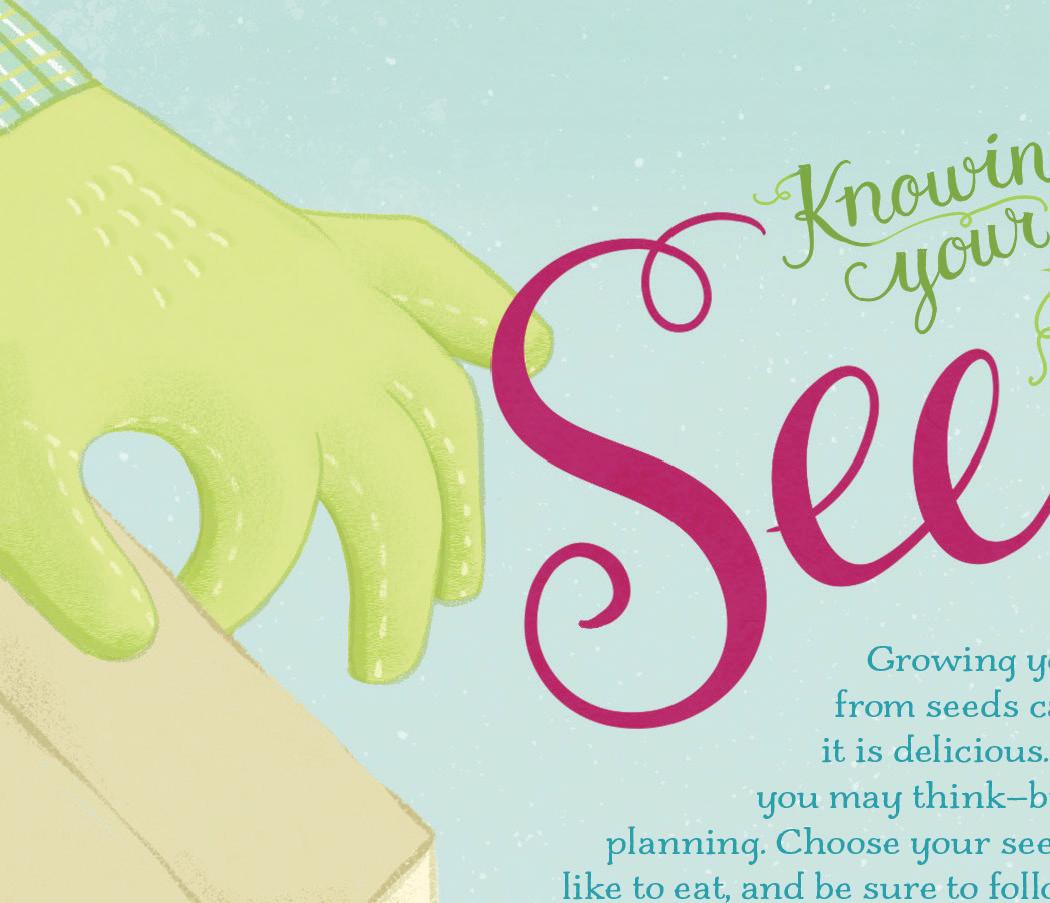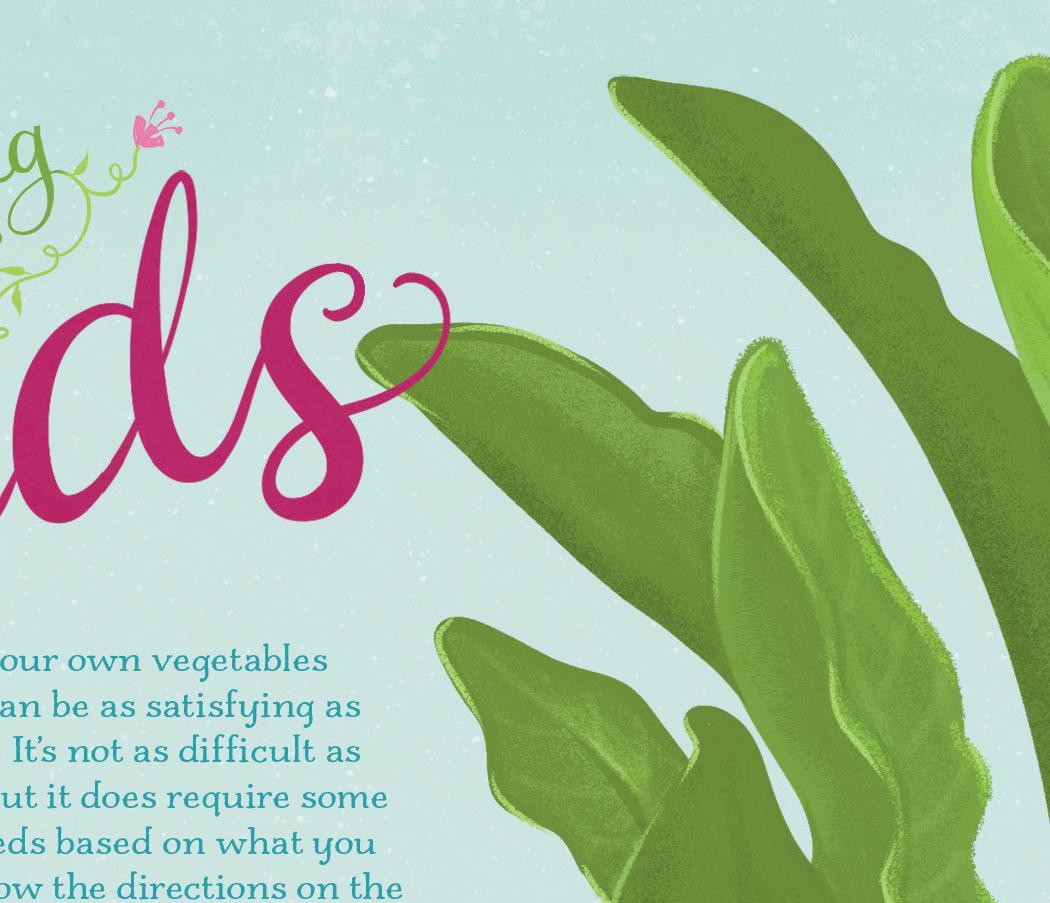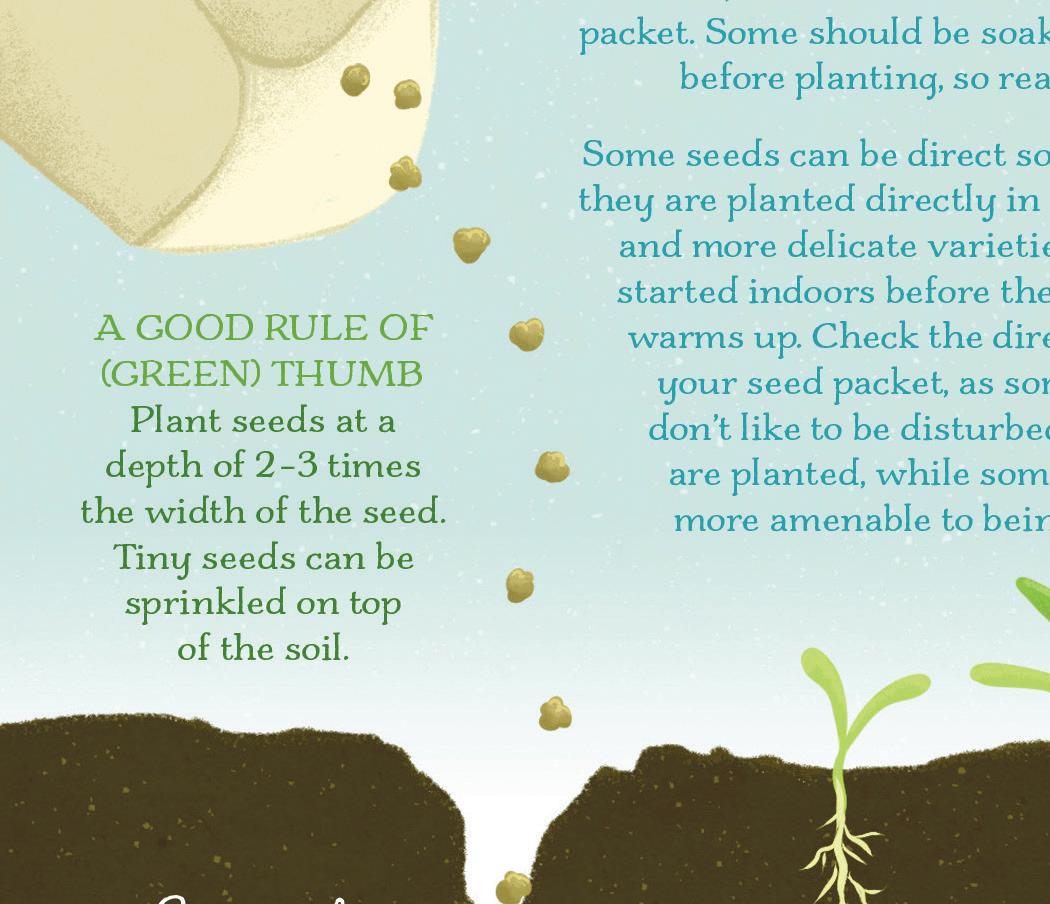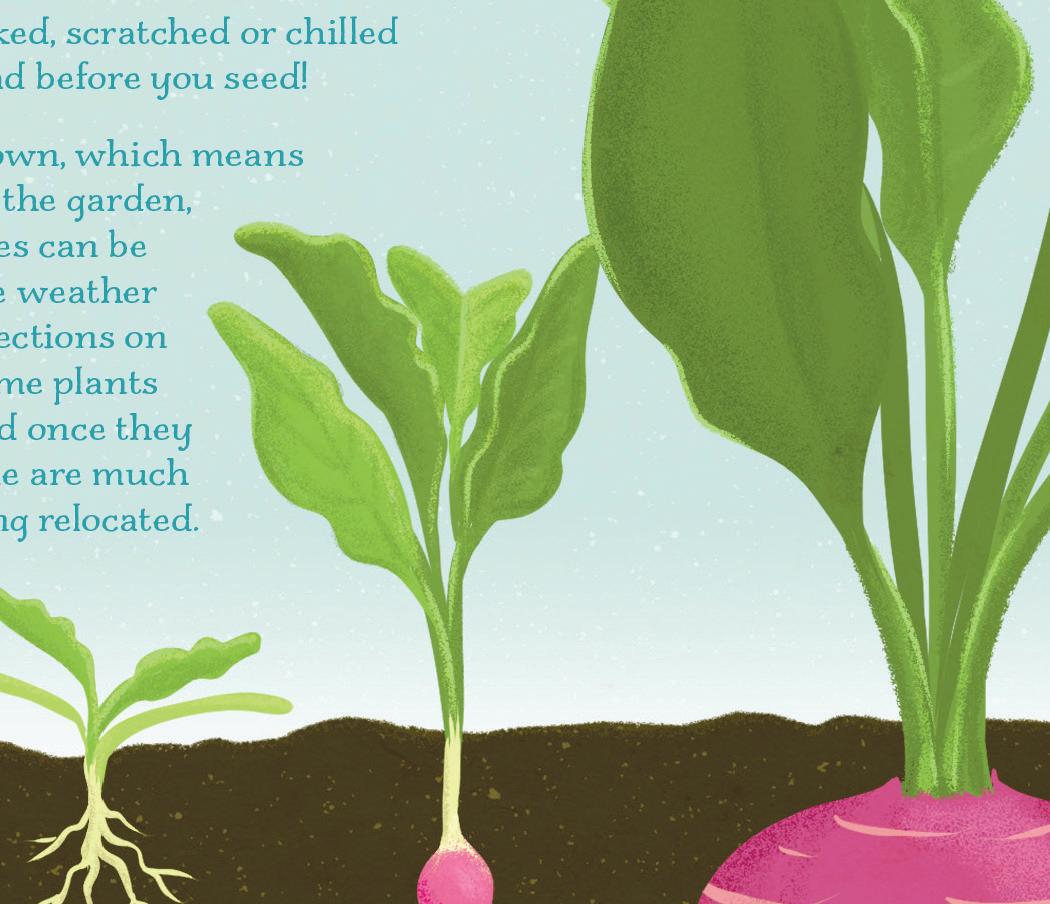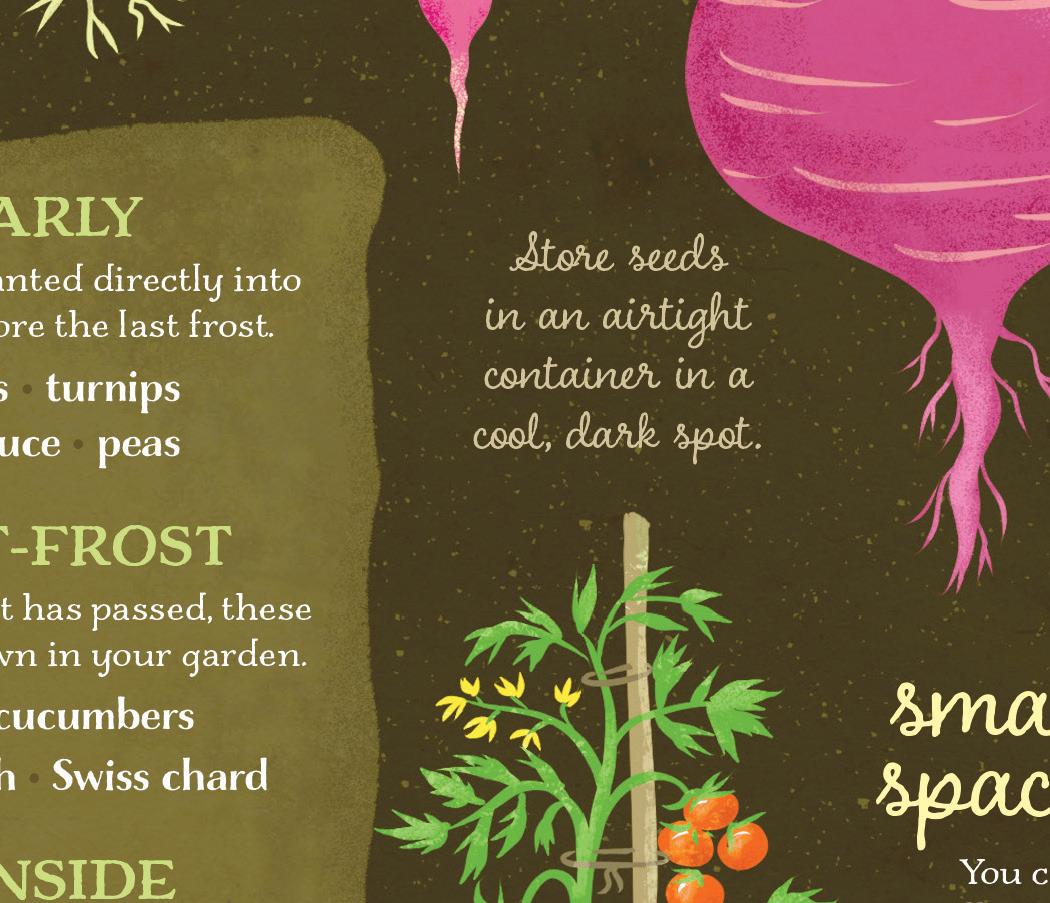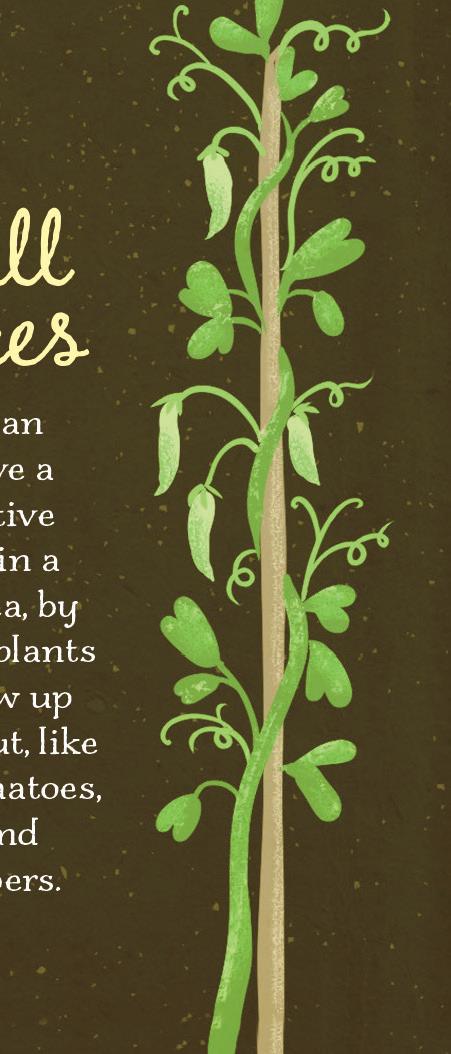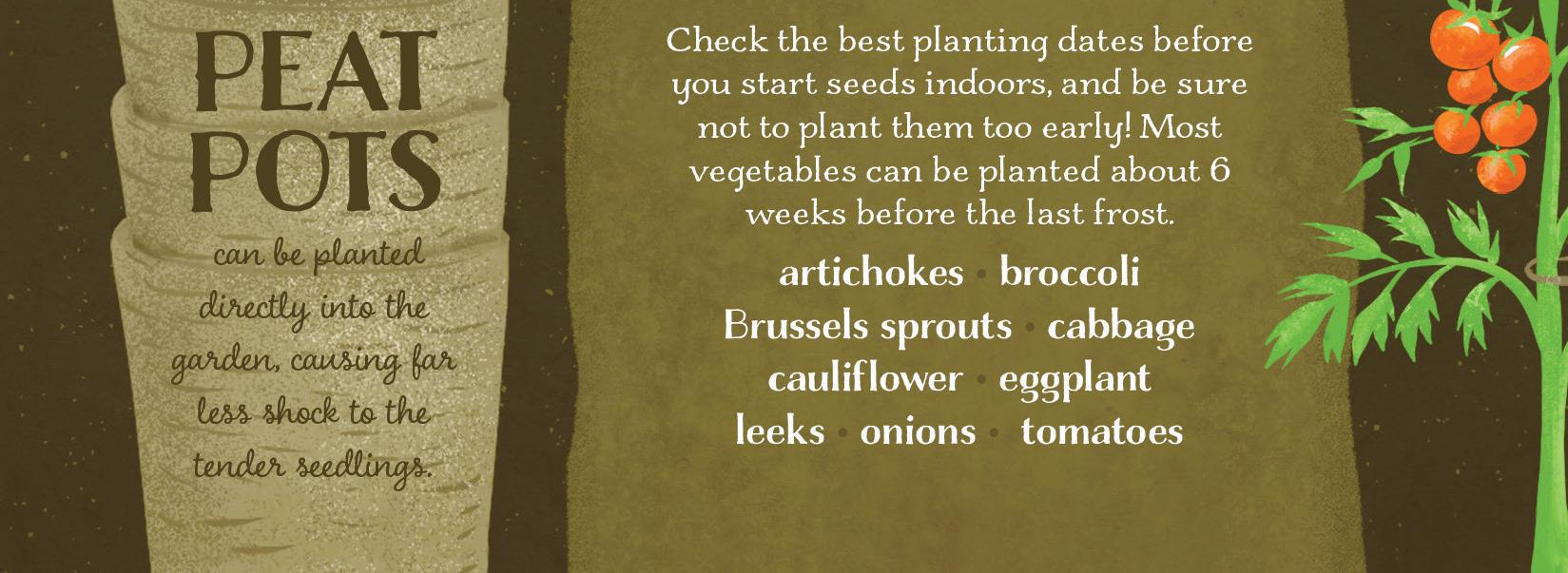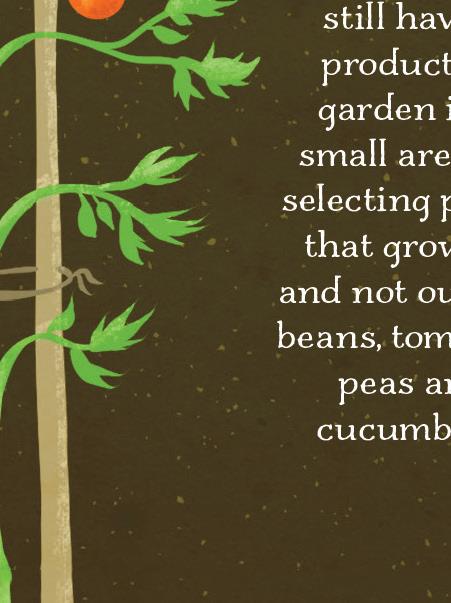edible ®
San Fernando Valley
CELEBRATING
LOCAL FOOD & DRINK, SEASON BY SEASON


LOCAL FOOD & DRINK, SEASON BY SEASON











 BY ANNE KALLAS
LUCE
BY ANNE KALLAS
LUCE
RECIPES
12 Herbed Salmon Filet with English Pea Salad
14 Creamy Kohlrabi Soup with King Crab
COVER
Spring rolls are the perfect showcase for the edible flowers of spring. Find the recipe on page 28.
On this page: Kohlrabi is an oft-overlooked spring vegetable that we used in a creamy soup on page 14.
of which is edible.
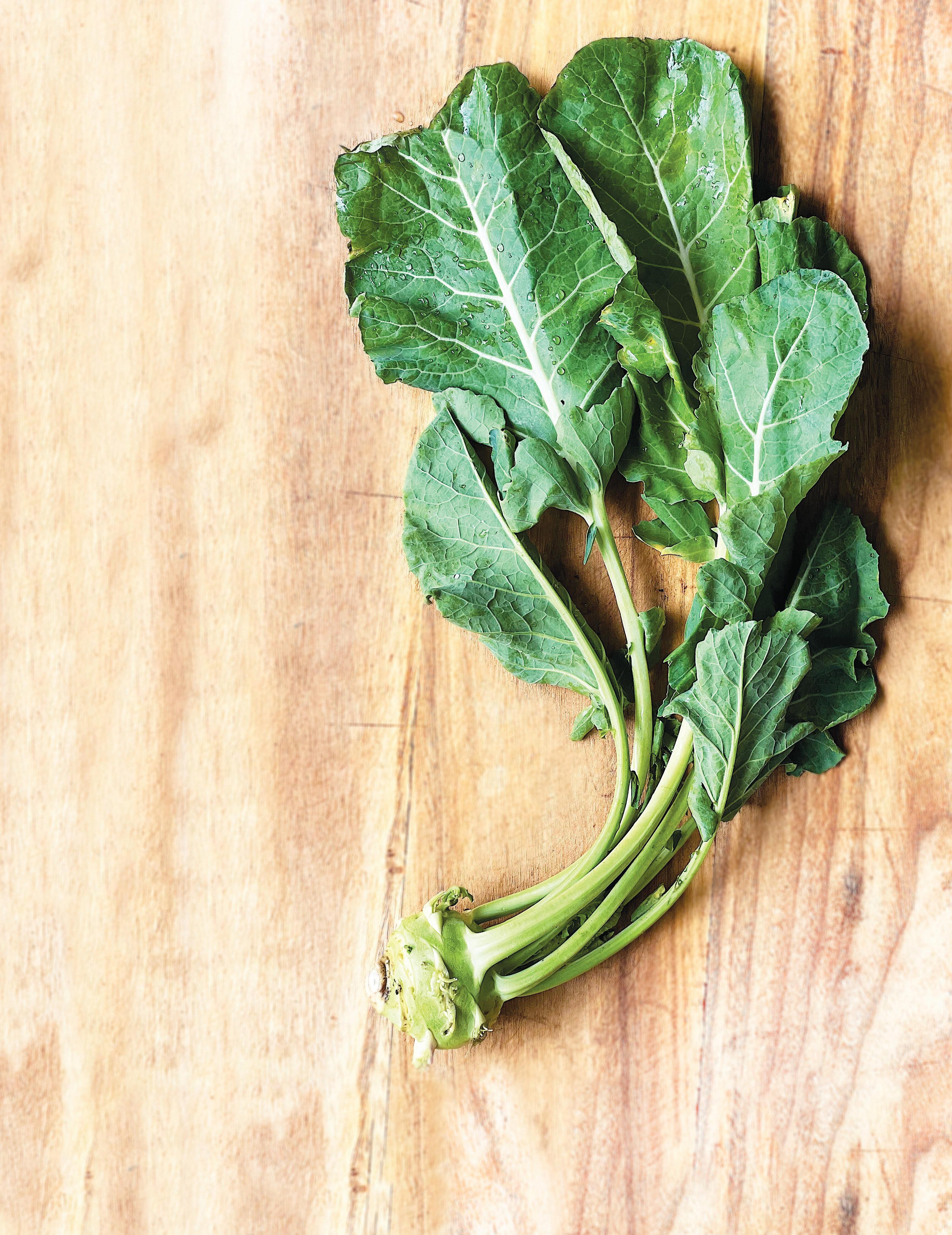




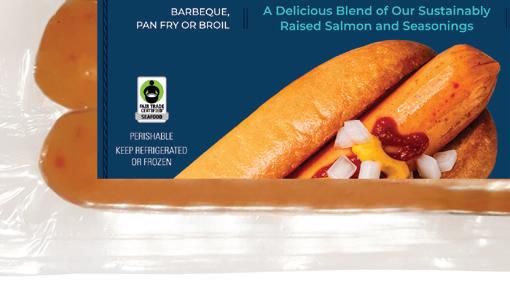
















“The garden suggests there might be a place where we can meet nature halfway.”
—Michael PollanOregon called. They want their weather back. Or maybe that was California initiating the call …
It is hard to talk about gardening without focusing on the weather, especially when the weather has been so unusual: snow in Burbank and Santa Clarita; tornados in Montebello; hail all over and rain levels that are at least double the seasonal averages at measuring stations in Van Nuys, Burbank and the Santa Clarita Valley.

Predictions for a dry and warm spring in LA County rely heavily on almanacs, which have been recording weather since 1818. But according to a 2010 study by the University of Illinois, those predictions are about 52% accurate, at best. It might be equivalent to throwing spaghetti against a wall to see what sticks. (A valid strategy for many things, in my opinion, just maybe not weather forecasts.)
Without a real idea of what is to come, we can really only go by what we know. This is the first year in several that I haven’t had to use my garden sprinklers for multiple months in a row. That is a boon for my water bill, at least! While my garden is quite overrun by some sort of tall thick grass, the soil is the most fragrant and beautiful it has ever been. My perennials (for the pollinators) are blooming explosively and I have volunteer tomato plants sprouting all over. It all gives me hope that this year, at last, my “fake it ’til you make it” gardening strategy will come to fruition … quite literally.
With every issue, I learn so much as we bring these stories together. And this one is no exception. From the workings of bees (“The Valley Hive,” page 18) to the success of a school garden (“Cultivating Gardeners,” page 22), and from composting with kids (“Edible for Kids,” page 26) to eating flowers (see pages 16, 28, 30, 32), our garden issue has given me new strategies in both my garden and kitchen, and I hope it does the same for you.
It remains to be seen how long I—or, rather, my garden—can go without resorting again to the sprinklers, but I know that this year, at least, nature stands a pretty good chance of being the hero of my dinner plate.
Until next season, may your garden be rich in nutrients and full of plants, and may your plate be full of your garden’s bounty.
San Fernando Valley
PUBLISHER & EDITOR

Tami Chu
COPY EDITOR
Doug Adrianson
DESIGN


Cheryl Angelina Koehler
CONTRIBUTORS
Mark Donofrio • Anne Kallas
John Lechleidner
Suzanne Luce
Jennifer Richardson
Jess Starwood
PHOTOGRAPHERS

Viktor Budnik • Eden Chu
Tami Chu • Mariah Green
Carolina Korman
Jess Starwood
ILLUSTRATORS
Ramiah Chu
SALES
Mary DiCesare mary@edibleventuracounty.com
Eric Hargrove eric@ediblesfvalley.com
SUBSCRIPTIONS
EdibleSanFernandoValley.com info@ediblesfvalley.com

CONTACT US
Edible San Fernando Valley 2470 Stearns St. #142 Simi Valley, CA 93063 805-622-9355 info@ediblesfvalley.com
Edible San Fernando Valley is published seasonally, four times a year. We are an advertising- and subscriber-supported publication, locally and independently owned and operated and a member of Edible Communities, Inc. Distribution is throughout the San Fernando Valley, Santa Clarita Valley and Pasadena and by subscription for $29 per year. Every effort is made to avoid errors, misspellings and omissions. If, however, an error comes to your attention, please accept our sincere apologies and let us know. No part of this publication may be used without written permission of the publisher. © 2023. All rights reserved.
Publisher and EditorOUR MISSION: Currently in its first year, Edible San Fernando Valley has been founded to document and bring to life the interest in farm-totable, organic and natural foods, and to acknowledge the people and communities who feed and sustain us. We want to inspire readers to support and celebrate the growers, producers, chefs, food and beverage artisans and other food professionals in our community.













When you think of French food, it’s easy to default to clichés: flaky croissants, ripe cheeses and pungent pâtés, all of which rely on ingredients derived from animals. But Angelique S. Green, who was born and raised in the north of France near Lille, then lived in Paris in her 20s, is doing her best to change that, one Los Angeles farmers’ market at a time.

Each week, Green brings her seasonal, no-sugar-added, gluten- and dairy-free creations to the Old Town Newhall, College of the Canyons and Culver City farmers’ markets under the brand name L’Angelique. These include herbal iced teas, wellness shots, latte shakes, sea moss gels, salads and soups, salad dressing, probiotic yogurt and granola. Whether with fresh lemonade in summer or pumpkin-spice cashew milk in winter, Green is adamant about showing her customers that health and pleasure aren’t just compatible, they’re ideal bedfellows.
Green moved from Paris to New York in 2011, then, with her husband, from New York to Los Angeles in February of 2020, just as the pandemic was shutting down the world. Her career as a project manager designing trips for people visiting the United States was put on hold, and she was drawn back into the professional realm of food. Green had previously studied at Ecole Hoteliere De Souillac in France; catered in Paris and New York, including recipe and special event design; and trained at the now-closed Crave restaurant in Brooklyn. This time around she wanted to focus on food made without anything artificial or processed, paying homage to the home-cooked meals and natural remedies from her Franco Senegalese upbringing. Green took classes online and became a naturopath, imbuing her recipes
with the principles of prevention and self-healing, with a focus on gutmicrobiome balance. Soon she was selling her products in farmers’ markets, where she was also sourcing many of her raw ingredients.





During the pandemic, Green noticed the stark contrast between the grocery-store panic buying of the early days of COVID-19 and the refuge that outdoor farmers’ markets became as a safer alternative for many. She is still a firm believer in their power to educate people on seasonality and where their food comes from, even as the world has opened back up, exhorting us all to “Go to farmers’ markets: rediscover, reconnect!”
A selection of Green’s products, including Sea Moss Energy Shot, Sea Moss Ice Coffee Latte and Sea Moss Matcha Latte are also available at the recently opened Culver City French bakery Des Croissants Paris, which she runs with her business partner, owner Samuel Manar.
Like her products, Green keeps her own diet mostly plant-based, but also eats fish and enjoys cheese, which leaves me thinking she’d be on board if you use your Sea Moss Ice Coffee Latte to wash down a cheeky croissant. As America’s favorite “French” chef, Julia Child, was fond of saying: “Everything in moderation, including moderation.”
In addition to farmers’ markers, L’Angelique products are available on Green’s website, Langelique.shop.






Jennifer Richardson is the author of Americashire: A Field Guide to a Marriage, an Indie Reader Discovery Award winner for travel writing. She and her British husband consider themselves lucky to call both Ventura and a village in the English Cotswolds home. To learn more, visit JenniferRichardson.net.







You can call the warm meals from HomeState delicious. You can call the cuisine at HomeState homestyle. But whatever you do, don’t call it Tex-Mex (no matter what Google Maps tells you), says owner and founder Briana Valdez. “It’s part of, but not the whole. When we’re training with new team members, we avoid using the term ‘Tex-Mex.’”
According to Briana, who grew up all over Texas, their food reflects different parts of the Texas story. Barbecue is part of it—“but not the whole story.” Their humanely raised brisket comes from Creekstone Farms before being seasoned with salt and pepper and cooked overnight in the oven, so that it falls apart and releases delectable juices that are folded into the meat used each day.
“It’s trying to shift people’s minds to redefine what [Tex-Mex] means. This is a new genre for me,” she says, explaining that Texas cuisine derives from a myriad of cultures that intersect in the Lone Star State, bringing their culinary traditions with them.
No matter what the terminology, the focus of HomeState is family,
whether it’s Briana’s family—where she learned the generations-old art of making flour tacos, now featured daily—or the many families that come into the restaurant.

Briana is the second of triplets, who include sisters Andy and Corina. She also has two older sisters, Maribel and Naomi, who passed away.
“Food has always played an essential role in our life,” says Andy Valdez, who works at HomeState. “We kids would all be in the house, with our grandmother, mom and aunts cooking and my dad, uncles and granddad singing and playing accordion and guitar. Food has always been at the center, all integrated with family, friends and community.”
Andy says it helps her in her job, which includes maintaining the HomeState social media, public relations and all guest-facing activity, to be so close to her sister.
“We’ve always said we’re very fortunate to always be with two best friends,” says Andy, adding that the sisters share what is often called a twin bond, which also applies to triplets.
Briana worked as a host at Thomas Keller’s Bouchon, where she soaked up as much knowledge about the restaurant business as she could. “I was very aware of the food we served, the purveyors and sourcing, the quality of purveyors. Every single component of the experience was highly considered,” she says. “I thought, ‘Wouldn’t it be more amazing to do that kind of intention in something that’s affordable for most people rather than just high-ticket items?’ It inspired me to take that level of consideration to HomeState.”
Briana spent four years making plans, which included finding vendors who could supply the restaurant with ingredients that met her high standards. This includes the best meat and eggs, while maintaining the highest standards for raising farm animals, sourcing and roasting coffee, hand-making corn tortillas and distilling the best tequila. All while somehow finding a price point to profitably offer affordable food and pay staff a living wage.
She says most people she talked to in the restaurant business thought she was crazy pursuing such an ambitious concept, but Briana was determined. And now HomeState has five locations around the Los Angeles area, with another under development in Oceanside.
HomeState’s success is no accident. It requires careful planning and coordinating to maintain quality at a low price. When she found egg purveyor Vital Farms, Briana was impressed by the care for the pasture-raised chickens. Such care comes with a price.









“It’s a little more expensive than what works for our bottom line. I’m very proud of working those issues out for our menu. We can feed a family good food at an affordable price,” she says.
The star of the HomeState menu (unless you count the queso) is arguably the handmade flour tortillas, which are based on Briana’s family recipes. Each tortilla is shaped and rolled out by hand.
Briana says that process led to quality-control problems as HomeState expanded. “The people who make the tortillas have been with the company for a while so they’re familiar with the dough—how it feels.” They tried to have the people at each location make the tortillas, but the results weren’t up to par. “So we moved to a larger kitchen where we have the same people who were making the dough initially make it for all of the restaurants,” she says.
There have been other problems too, Briana says. In Sherman Oaks, which recently opened, a series of burglaries have made it necessary to institute a no-cash policy to lessen the danger to employees.
It’s discouraging, but Briana has no plans to give up. She never has, and she never will.
Find HomeState at MyHomeState.com





Facebook: MyHomeState | Instagram: HomeState

Like so many parents, Chef John Lechleidner wants a work/ life balance that allows him to be with his family. Working full-time in a restaurant doesn’t allow for that.

Lechleidner had risen to the top of his profession, having worked for 20 years at Wolfgang Puck kitchens in Las Vegas (Postrio at the Venetian and Spago in the Forum Shops at Caesars) and in Atlantic City, NJ, (American Grille at the Borgata) before moving to Los Angeles where he eventually helped head up the kitchen at WP24 in the Ritz-Carlton at L.A. Live.
When the pandemic hit, it was especially hard on the restaurant business, and suddenly Lechleidner was able to spend more time at home in Sherman Oaks with his family: wife Jennifer Lechleidner and children Quinn, 7, and Thurston, 4. Ultimately, he decided to become a stay-at-home dad.
“In a restaurant, you work 12- to 16-hour days and nights, weekends and holidays. It’s not conducive to having kids and a family,” he
says. “My wife works in production, and her job has a lot more flexibility. If I stay at home, it gives us a lot more freedom to do things with the kids.”
Going from the top echelons of the culinary world to making kiddie lunches was quite an adjustment, and Lechleidner found he needed something else to scratch his creative itch.
So he started a video blog, or vlog, A Chef and His Spoon, where he shares recipes and tips in short succinct videos using voice-over and low-key music.
“Restaurant dishes are very involved. I didn’t know how to translate that to YouTube. I thought, ‘What can I do to simplify things but still have that restaurant taste?’” he says. “I have a salmon dish that I posted. Everyone at home buys a small salmon tail filet. You won’t see that in a restaurant. You need an inch-high piece of salmon that you take and portion for nice square pieces. It’s taking the restaurant mentality of cooking and applying it to quick, home-cooked meals.
Fine cooking is not as scary as you think it is.”



The vlog also serves to preserve and pass down recipes from his childhood to the next generation, such as his mom’s cranberry apple cake that takes three to four days until it’s ready to eat.
In addition to creating and posting easy restaurant-quality meals, Lechleidner also has to make meals for his two fairly picky children who have food allergies and can’t eat eggs. He has created an eggless pavlova recipe using aquafaba from cans of chickpeas that is not only great for his children, but is also vegan—using whipped coconut milk.

Lechleidner’s mother, Debra Lechleidner, says John has always been interested in food. She praises her middle child, between two sisters— “like bookends. He was always the calm one in the house.
“Since he was young, he had interest in food and in preparing it. I did some of the cooking. So did his dad,” says Debra. “I wouldn’t say we were adventurous food eaters as a family. Out of all my kids, he was the one who was a good eater. Not fussy. Always willing to try things.”
Because Debra lives in New Jersey she doesn’t get to see her son as often as she would like. The YouTube videos help—even if it isn’t a two-way conversation. “I do watch his videos,” she says. “I’m very proud of him.”
Now that John has been regularly making videos, he’s branched out into creating custom spice mixes, called Spoon Spices. In a recent video, where he makes his version of Chef Thomas Keller’s baked zucchini, John uses his caponata spice blend: tomato powder, orange peel, basil, parsley, oregano, dried kalamata olives, peppers and capers, chili flakes, fennel and oregano.
To make the blends, John has rented kitchen space in Van Nuys where he can work in a sanitary environment that meets licensing requirements. He spends a lot of time trying to figure out the best herbs and spices that bring their flavor to his mixes. “I try different samples. I know what fresh marjoram smells and tastes like. I compare the taste and get the ones that match,” says John, who hopes to create unique spice and herb mixes that stand out from the crowd.
Follow A Chef and His Spoon on YouTube: YouTube.com/@achefandhisspoon

Find Chef John’s spice and herb blends at SpoonSpices.com.
John shares some of his favorite seasonal recipes in the following pages to help us to bring fine dining into our own homes.
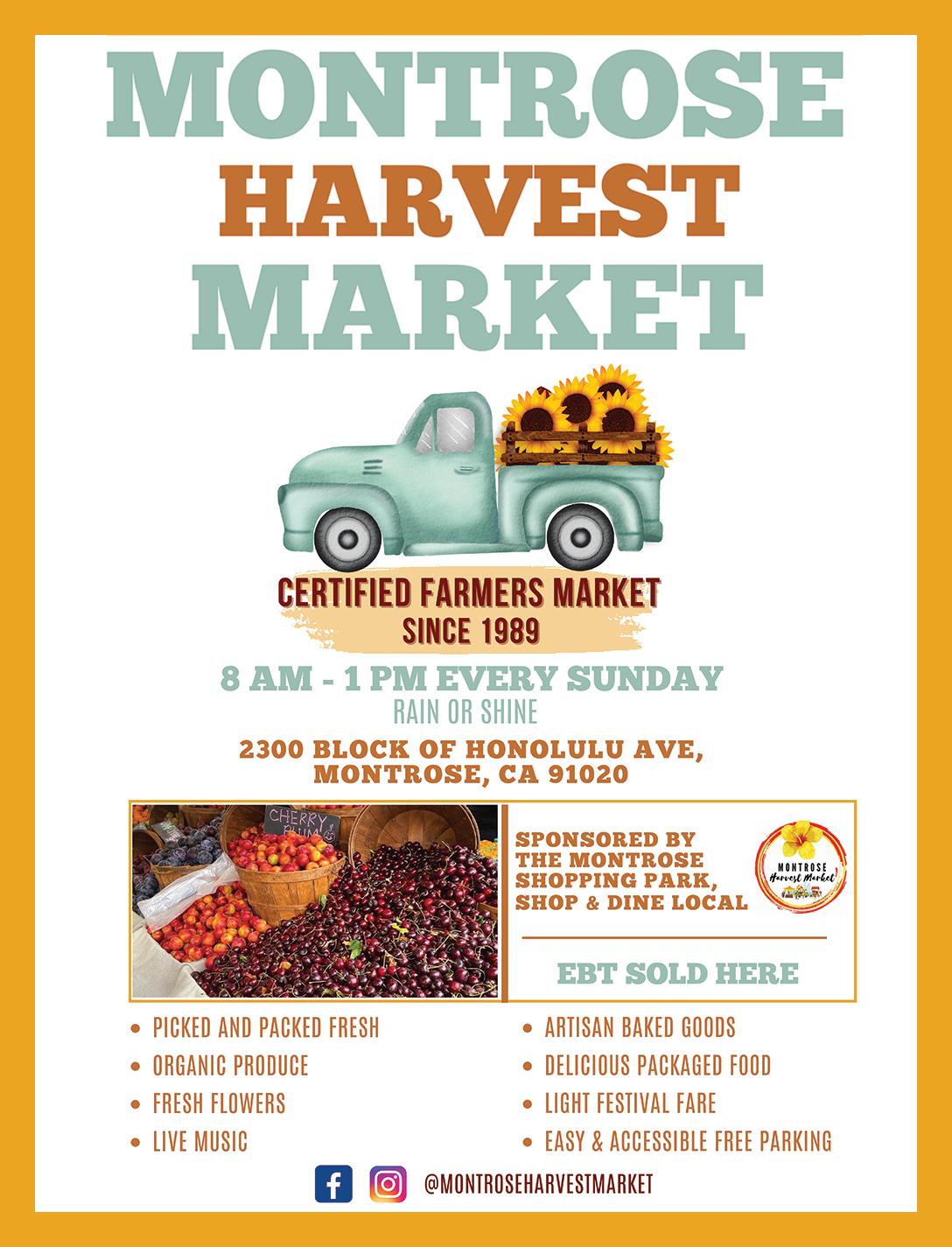

The richness of the king salmon pairs great with the fresh peas and bitter radicchio, with just a hint of lemon zest to brighten the dish. Most of the time the tops of fennel get put in the compost, but they are a great way to add bursts of flavor without being too overpowering.
Serves 4
4 salmon filets, skin on (6- to 8-ounce portions)
Salt and pepper, to taste
2 tablespoons olive oil
4 tablespoons olive oil for cooking
2 tablespoons unsalted butter
Lightly season filets with salt and pepper. Drizzle with olive oil.
In a large sauté pan over medium-high heat, add cooking oil. Once hot, add the salmon filets skin side down. Cook for 2 minutes and then place a lid, offset, and reduce heat to medium-low.
Cook the fish for 4 minutes more, or until skin is crispy, then add butter and baste (spoon melted butter over the fish) for 30 seconds. Remove fish from pan and let rest for 2 minutes.
For the English pea salad:
2 tablespoons olive oil
⅛ cup shallots, cut into rings
2 garlic cloves, sliced
½ cup radicchio, cut into ½-inch squares
2 cups English peas
¼ cup chicken broth
1 tablespoon unsalted butter
Kosher salt and black pepper, to taste
1 cup fennel tops
2 cups pea shoots
1 teaspoon lemon zest
In a sauté pan over medium heat add the olive oil, shallots and garlic. Lightly caramelize (cook, stirring, until shallots are translucent and garlic is golden) then add radicchio. Cook for about 30 seconds then add the peas, chicken broth and butter. Season with salt and pepper. Cook until the peas are tender and have a nice glaze on them.
Remove from heat and add the fennel tops, pea shoots and lemon zest. Toss together lightly.
Herb Butter Sauce
½ cup vegetable broth
⅛ cup heavy cream
½ cup butter
Salt and pepper, to taste
1½ tablespoons Herby Mustard Blend (recipe below)
Add broth and cream to a small pan. Bring to a boil then turn off heat.
Add the Herby Mustard Blend. Slowly whisk in the butter until it is all incorporated. Adjust seasoning with salt and pepper.
To Serve: On the center of a serving platter or individual plates, lay down 1 cup of pea salad per salmon filet. Top salad with salmon, then liberally spoon herb butter sauce over the top of the fish. If desired, add a couple more pea shoots to the top of the salmon and serve immediately.
Herby Mustard Blend from SpoonSpices.com
½ teaspoon crushed yellow mustard seeds
½ teaspoon chopped chives
½ teaspoon chopped tarragon
½ teaspoon chopped basil
½ teaspoon chopped dill

½ teaspoon chopped parsley
½ teaspoon lemon zest
¼ teaspoon chopped garlic
¼ teaspoon black pepper
¼ teaspoon kosher salt
Mix all ingredients together.

Kohlrabi is a vegetable that is often overlooked in the markets, but its buttery peppery flavor lends itself to a great soup. This creamy and rich soup goes great with the saltiness of the bacon and brininess of the king crab.
Serves 4
For the Soup
3 tablespoons butter
½ cup thin-sliced yellow onion
2 garlic cloves, smashed
3 cups diced kohlrabi*
2 cups vegetable broth
½ cup heavy cream
2 teaspoons kosher salt
For the Garnish
3 slices bacon, sliced thin
2 tablespoons small-diced shallot
1 cup small-diced kohlrabi
8 ounces shredded king crab
1 teaspoon lemon zest
2 tablespoons parsley leaves
Kosher salt and black pepper
Extra virgin olive oil
To assemble: Pour the soup into a bowl and add the garnish to the center of the bowl. Add the parsley leaves and drizzle with olive oil.
*Chef’s Note: Dicing the kohlrabi small will aid in faster cooking.
In a medium pot over medium-low heat, melt the butter. Add onions, garlic and kohlrabi. Cook slowly until the onions are soft. Add the vegetable broth and simmer until the kohlrabi is fork-tender. Add heavy cream and simmer for 5 minutes. Add the vegetables and liquid to a blender. Purée until smooth. Adjust seasoning to taste.
In a small sauté pan add bacon and cook until crispy. Remove bacon and leave the fat in pan. Add the shallots and kohlrabi, and cook until tender and lightly caramelized. Reduce heat, then add the king crab and lemon zest and cook until just warmed through. Season with salt and pepper.




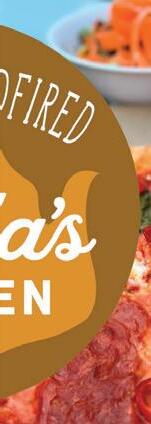

















Crudo is an Italian or Spanish word that means “raw.” In culinary terms, it usually refers to an uncooked fish or shellfish dressed with some sort of acidic sauce. Dandelion greens have a sharp and spicy flavor that goes great with the yellowtail. And the pickled peppers and onions add that hint of spice and acid that just brings it all together.
Serves 2–4
16 ounces yellowtail*, cut into ½-inch cubes
Dandelion Green Pistou (recipe below)
Pickled Peppers & Onions (recipe below)
½ ounce purple radish microgreens**
½ ounce golden pea shoots**
Assorted edible flowers**
Sea salt
1 lemon wedge
*You can substitute the yellowtail for salmon, tuna, mahi mahi or any other sashimi-grade fish.
**We got this spring produce from Hungry Gardens at the Montrose Harvest Market.
To assemble: Spoon the pistou onto the plate. Place the yellowtail on top of the sauce. Sprinkle each piece with sea salt and a drop of lemon juice. Garnish with the pickled peppers, pickled shallots, edible flowers and microgreens.
Dandelion Green Pistou
Pistou is a sauce that is similar to a pesto. This one is vegan.
2 garlic cloves
⅛ cup shallot rings
1 cup olive oil
2 teaspoon sugar
1 teaspoon rosemary
2 teaspoon lemon zest
⅔ cup dandelion greens, washed, dried and rough chopped
Salt and black pepper, to taste
In a high-speed blender, add everything except the dandelion greens. Purée until smooth, then add the dandelion greens and purée until smooth. Adjust seasoning with salt and pepper.
Pickled Shallots & Peppers
Prep the day before needed.
1 cup white vinegar
⅔ cup sugar
1 cup ice
2 teaspoons salt
1 cup red jalapeño pepper rings
1 cup shallots rings
In a pot, add the white vinegar and sugar. Bring to a simmer and cook until all the sugar is dissolved. Remove from the heat and add the ice. Place the peppers and shallots in separate jars and pour the cooled pickling liquid over top to cover. Add 1 teaspoon salt to each jar, mix and let sit overnight.


Keith Roberts, co-owner of The Valley Hive in Chatsworth, asks me this question a few minutes into our interview. Pressed for a number, I guess a thousand, only to be told to add a few zeroes and double it. His main point is that a bee makes about 2 million trips to retrieve the nectar from those flowers, and it sets the tone of appreciation, even reverence, he shows for these industrious creatures as we continue to talk.
As he puts it at one point, bees are “more than just flying stingers.”
Roberts started The Valley Hive in 2014 with Danny Finkelstein, offering a variety of beekeeping-related products and services, from raw honey to courses on beekeeping and colony management.


Asked to describe the business, Roberts can’t resist a pun. “We’re cross-pollinating,” he tells me, explaining that The Valley Hive serves both those who want to enjoy the literal fruit of the bees’ labor, as well as the actual beekeeping.
“Everything revolves around the love for bees and the people who keep them.”
It’s also a place where people can get a close-up look at bees, thanks to the shop’s eight-frame vertical observation hive, which was hosting about 15,000 bees at the time Roberts showed it to me but has the capacity for about twice that.
It’s the same type of hive that introduced Roberts to bees when a chance visit to the Los Angeles County Fair brought him by the booth of the Los Angeles County Beekeepers Association, an organization founded in 1873, dedicated to the care and welfare of the honeybee.
“The hair stood up on the back of my neck, and I knew that’s what I wanted to do with my life.”
He spent two hours asking the beekeeper at the booth everything about bees, went to a Barnes & Noble and bought all the books he could find on the topic, then found a mentor in a professional beekeeper, the late Walt McBride.
“How many flowers do you think it takes to make a single pound of honey?”Top of this page: The shop’s observation frame, housing several thousand bees, is the front-facing hive inside the store. Opposite: Fountains in front of the store provide constant water for the busy insects.





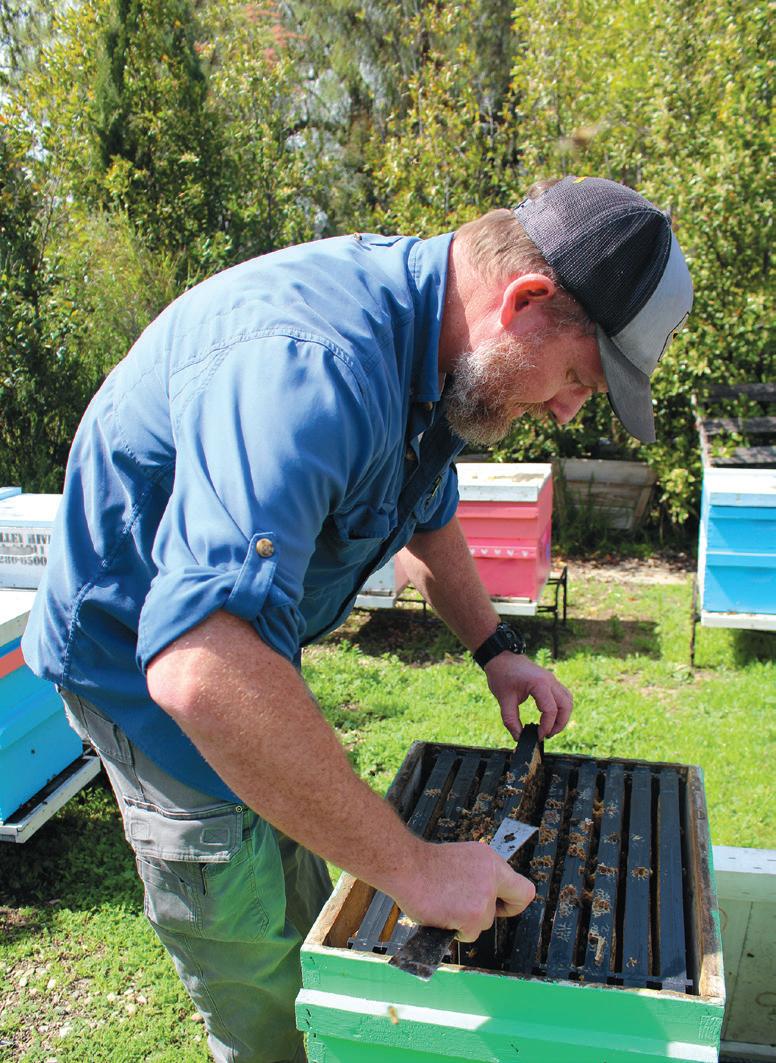

By 2009, Roberts had started his first bee-related business, Enterprising Bee Company, doing bee removals from people’s homes, making honey, lip balm, lotions, and candles, and fielding calls from urban beekeepers who needed help. One of those beekeepers was Danny Finkelstein. Shortly thereafter, Roberts and Finkelstein teamed up to launch The Valley Hive, which now has more than half a dozen employees.
The Valley Hive also sells plants in its Topanga Nursery, part of the Chatsworth site and an obvious complement given Roberts’ assertion that “the best beekeepers are gardeners.”

“I tell my students, ‘If you don’t have a garden, then start one. Start one before you get the bees and you’ll begin to understand the cyclical nature of beekeeping: If it doesn’t happen outside the hive, it’s not going to happen inside the hive.’”
Inside The Valley Hive, Roberts is excited to share that their honey competition for backyard beekeepers will be back this October after a pandemic-induced hiatus. The event also includes a competition for the best honey-based recipe and raises money for the Los Angeles County Beekeepers Association’s funding of honeybee research.
When asked what he wants people to know about The Valley Hive, Roberts doesn’t tout his products or services. Instead, he returns to a theme of our conversation: community.


“I envision our business, The Valley Hive, to be representative of a colony and being here for the community—being a resource for education, for wonder and appreciation for one of the most valuable pollinators on the planet.”
Outside of their location in Chatsworth, The Valley Hive sells locally sourced, raw honey at the Calabasas and Westlake Farmers’ Markets. You can also find them online at TheValleyHive.com.
Opposite: Tucked away in the back of the nursery, accessible by invitation and special gear only, several hive boxes buzz with honey-producing bees. Keith Roberts, beekeeper and co-owner of The Valley Hive, shows the activity inside the hives with just a smoker to remind the bees to be docile.

 BY SUZANNE LUCE
PHOTOS BY CAROLINA KORMAN
BY SUZANNE LUCE
PHOTOS BY CAROLINA KORMAN
There are three things that Steve List won’t allow in his classroom: Hot Cheetos, Cup o’ Noodles and soda. Instead, this agriculture teacher and diligent keeper of the thriving agricultural center at Sylmar Charter High School teaches his students how to eat what he calls “a proper salad,” one lightly dressed with lemon and olive oil or freshly made salsa rather than drenched with blue cheese, ranch or Thousand Island dressing.
“As we grow and process vegetables and fruits at the school, I try to teach them that they need to eat fruits and vegetables every day,” says List. “They are hesitant at first— but when they start to try it and see how fresh it is, they are interested.”
List occasionally goes out to speak at the nearby elementary schools in Sylmar, including the campus where his three grandchildren attend, and he says that the kids now all know what it means when he holds up his hand: “You need to eat five fruits and veggies every day,” they say, and they hold their hands up, too.
Encouraged by students’ curiosity, List continues to remind them to put more color on their plates. “They don’t know how to eat healthy, and many of their parents don’t either—so maybe if I teach them, they can teach their parents,” he says with optimism. Over time, and beyond changing eating habits, he hopes his students will find enjoyment and purpose in gardening.
List can’t keep himself away from the school’s agriculture center. He lives nearby and walks the mile from his home every day, even when school is not in session. He refills the 15 hummingbird feeders, checks on the chickens, and sees what there might be to discover and enjoy, from tasting new varieties of tomatoes to simply grabbing fresh chard and eggs for his breakfast.
It was List’s gardener parents who gave him the love and the skills, so he was able
to work his way through Pierce College and UCLA with a nursery job, and he later started his own landscaping business. In 1998, at 38 years old, he was offered a teaching job and has been teaching ever since. He came to Sylmar Charter High School in 2006, where he has helped build up its on-campus agricultural center into two flourishing acres of gardens plus a full nursery. A visitor finds pollinator, medicinal and lavender gardens; a fruit orchard and stone fruit nursery; towering rows of tomatoes (they are weeds and do better unpruned, says List); a pepper garden with varieties ranging from sweet bells
to the hottest in the world (Carolina Reaper); an antioxidant garden with jujubes, persimmons and pomegranates; and 30 chickens (for eggs and fertilizer). There are also spouts and barrels for rain harvesting and a large-scale composting operation.
List takes responsibility for maintaining the grounds, but he has limited resources, so digging deep with the youth every day serves two purposes: getting the garden work done and simply keeping the kids busy. List’s curriculum is fluid, and changes with the seasons and as opportunities arise with donations and partnerships. The principal and

fellow staff appreciate that the students are happy and that the garden is thriving with plenty of produce to share.
This winter at the agricultural center, List and his students harvested lettuces and broccoli and kept busy sprouting plants from seeds and tending cuttings that will be moved into one-gallon pots, and then shared with the community or taken home by students. They also graduate trees into 15-gallon pots and larger boxes to give away to other agriculture programs, community gardens, families and beautification projects. The students have learned that rainwater collected in barrels on campus is a precious commodity in the greenhouse: Rainwater has a neutral pH and a bit of nitrogen, so it gives seedlings a better start than tap water.
Just before spring, the students planted 1,500 strawberry plants and 1,000 bare-root trees, and they planned for their summer vegetables, including over 20 varieties of tomatoes, which range from the world’s smallest cherry tomato (Spoon) to heirlooms and Japanese hybrids, plus List’s favorite tomato, Momotaro Gold, which he says has the best flavor.
“We are harvesting a five-gallon bucket of tomatoes every day for two months,” says List. “Nothing goes to waste and everything is given away, from the plants to the harvests.” He hosts tomato tast-
ings and salsa contests in the summer with students and community members to make use of the surplus of tomatoes and decide which varieties to plant next year.
Sylmar Charter High School is one of 10 schools in the district with an agriculture program. The ornamental horticulture classes that List teaches are part of LAUSD Career Technical Education, and List finds support in the district’s recent push to bring back shop classes and electives centered around vocational education.
List’s students graduate with hands-on experience in how to effectively tend gardens throughout the year and propagate plants in the greenhouse. The teens also learn about the agriculture industry as they consider possible career paths. For example, as List helps them learn how to grow wine grapes and hops on campus, they might imagine finding careers at one of the region’s many wineries and breweries.
Steve List’s enthusiasm for gardening doesn’t take the weekend off, and it rubs off on community members who flock to his lectures offered through Pacoima Beautiful, a nonprofit funded by grants from the City of Los Angeles. Topics include soil and composting, fruit

tree pruning and planting summer veggies. As a spokesperson for urban gardening, he has helped the City of Los Angeles give away over 800 rain barrels and he teach these recipients how to use them.
List challenges himself by trying out new techniques and new plants each year, working at new skills until he has mastered something he can teach. “If I haven’t done it hands-on or it hasn’t worked for me, I don’t lecture about it,” he says. At his workshops here in Southern California, he tells home gardeners they should be able to find something edible in their gardens every day, year-round. And to those who tell him gardening is expensive, he points out that everything you need can be near at hand, especially if you compost and collect rainwater.
“The problem is that certain people, only the few, do a ton for the environment, and the rest don’t do anything,” says List. “If everybody did a little bit, the world would be a better place.” He invests his energy into teaching with a firm belief that being involved in food through gardening helps the environment. This is the foundation he offers his students, regardless of what they might want to pursue after high school.

Steve List gives presentations at the Lopez Canyon Environmental Center in Sylmar, South Los Angeles Wetlands Park, Griffith Park and San Pedro Community Gardens, with new topics each month. Information, dates and videos of these community lectures are posted at his Instagram (@ask_mr_list) and YouTube channel (Ask Mr List), where you’ll find his tips on composting, growing tomatoes with his “lasagna” method of planting, and more.




Spring rolls are small wrapped appetizers common in many southeastern Asian cultures. They are a great way to highlight the fresh local vegetables of spring and a creative opportunity to impress friends and family alike. The rolls themselves are brightly flavored, but the sauces take them to a new level. This recipe allows for versatility in design and flavor combinations. They can be made ahead and served on a platter or made individually as needed.
Makes 25–30 rolls
Rice paper wrappers (found at local Asian markets and Whole Foods)
Warm water
Edible flowers (ours came from Hungry Gardens at the Montrose Harvest Market)
2–3 cups pea shoots
Mai fun rice noodles (vermicelli works too), cooked according to package directions
About 1 cup of each, julienned:
Carrots
Bell peppers
Snap peas
Red and green cabbage
Cucumbers
Jicama
Green onions
½ cup chopped peanuts or almonds
1 bunch cilantro, with stems trimmed
Microgreens of choice
Butter lettuce
To make each roll, pour warm water onto a shallow plate. Immerse a sheet of rice paper into the water, then lay it flat on a cutting board. Line the bottom third of the paper with edible flowers, pretty side facing the rice paper. On top of the flowers, layer about ⅛ cup pea shoots, 2–3 tablespoons noodles, your choice of vegetables and nuts, 2–4 sprigs of cilantro and a hefty pinch of microgreens.
Starting from the bottom, roll the rice paper over the filling to about ⅔ of the way up. Fold each side ⅓ of the way toward the middle to the seal the edges. Then roll the folded part upward to finish the spring roll. The paper will be sticky so be careful as you roll. Place finished spring roll on top of a leaf of butter lettuce on a plate and repeat.
Serve with sauces of choice.
For peanut soy sauce
½ cup peanut butter
⅓ cup soy sauce or tamari (for gluten free)
2 tablespoons toasted sesame oil
2 tablespoons rice vinegar
1 teaspoon pickled jalapeños, diced (see recipe on page 17)
1 tablespoon maple syrup
½-inch knob of ginger, grated on a Microplane
½ teaspoon garlic powder (or 1 clove garlic, minced)
Put all ingredients in a bowl and whisk until a smooth texture forms. There will be some lumps, especially if using crunchy peanut butter, but the overall texture should be well blended and smooth.
For sesame cilantro sauce
1 tablespoon toasted sesame oil
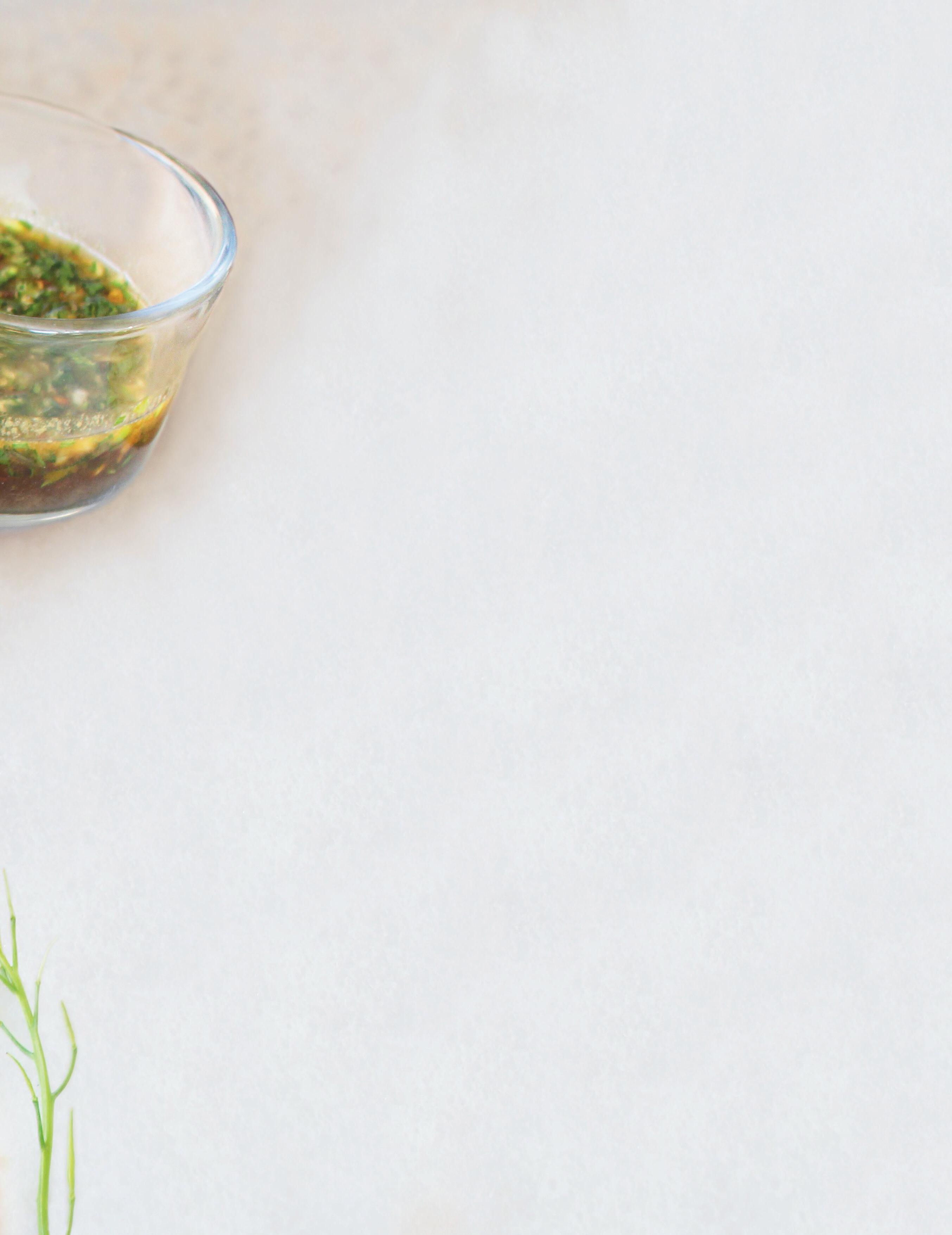
¼ cup soy sauce or tamari
½ teaspoon garlic powder
¼ cup chives or green onions, diced
½ teaspoon ground ginger
2 tablespoons rice vinegar
½ teaspoon crushed red pepper flakes
¼ cup cilantro, diced
Optional: 1 teaspoon toasted sesame seeds
Add all ingredients to a bowl and whisk until well mixed.



 BY MARK DONOFRIO | PHOTOS BY MARIAH GREEN
BY MARK DONOFRIO | PHOTOS BY MARIAH GREEN
Flowers are often recognized and lauded for their benefits to pollinators and for pest deterrence, but many flowers also have health benefits when consumed. Here, former restaurateur Mark Donofrio, who currently farms flowers and produce at The Starter Farm in Santa Ynez, shares some common flowers that can make tasty additions to your plate.


Marigold is a great cut flower, but at The Starter Farm we also plant these beauties to ward off harmful pests and the occasional rabbit (they don’t like the smell). Dried marigold flowers are added to our chicken feed to bring out that rich golden color in the yolks that screams “healthy!” But our favorite use is making ice cubes with the petals. Guests think we are fancy and it brightens that glass of cold sun tea!
Long considered a weed by westerners, marshmallow is actually a medicinal plant that is entirely edible. The slightly sweet root is eaten as a digestive support, and was the impetus of the modern fluffy treat (which is now made without this plant). Use the mild-flavored leaves in salads and as thickeners for soups (similar to okra) and the flowers in salads or dried for tea.
Slightly wider and flatter than chives, the leaves of garlic chive have a gentle garlicky flavor, and are often used for garnishes in soups and salads. The tiny white flowers carry a stronger flavor than the leaves and can be stir fried, chopped as a garnish or used to flavor butter. The stalks with unopened flower bulbs can be cooked up like asparagus. A word of warning though: The longer they are stored off the stalk, the stronger the flavor!
These gorgeous cornflowers, also called bachelor’s buttons, are most commonly used as a garnish in fresh salads. They have a slightly clove-like smell and flavor, with just a hint of spicy sweetness. They spruce up the look of any bouquet and can also be used as a natural food dye!
MARIGOLD GARLIC CHIVES MARSHMALLOWHerbs in the garden are great for flavoring dishes year round, but most often we snip off the flowers to give the herbs longer life. In fall, we allow some of our herbs to flower to bring in the beneficial bugs, but we can share the bounty. Oregano flowers can be used just like the leaves but have a milder flavor profile.
Ah, the squash blossom. Zucchini flowers get all the love but did you know that winter squash and pumpkins produce much larger flowers? We love their size for extra-large fried stuffed blooms. Stuff with a ricotta cheese mixture, batter with an egg and flour combo and fry lightly in good EVOO. Serve over a rich tomato sauce, sprinkle with a touch of salt and dinner is served. We also love to top our pizzas with these beautiful blooms.
For those who love cilantro, it is always a sad day when the plant bolts. But not anymore! You can eat the delicate white blossoms fresh in your salads and stir-fry dishes and know that you are also getting good amounts of vitamins A, C and K. The flowers still have the distinctive cilantro flavor but it is more mild.
We all use basil leaves for flavoring tomato sauce and making pesto but did you know the flowers add an anise flavor pop to just about any dish? Go ahead and roast those cherry tomatoes with onions and garlic for that wonderful spring-season pasta. Sprinkle the flowers and some great salty pecorino to finish that warming bowl of rigatoni!
Pansies and violas are perfect for dressing up kale salads, decorating cakes or finishing some local halibut dish from the Malibu shores. Coming in a range of colors, pansies are a rich source of potent plant compounds known to have antioxidant and antiinflammatory properties.
CALENDULA
Some chefs use calendula flowers to color rice instead of using the more expensive saffron. It is reported that calendula has anti-inflammatory properties when used in creams. We just love the pop of color it adds to a Spanish paella and swear we get a subtle honey flavor from the petals. Just add the petals to any dish!

Iced hibiscus tea is a staple during our workday. You actually use the dried calyx (the protective layer around the flower) to brew this bright red delicious caffeinefree hydrating tea. First, we boil water with sliced ginger, add dried hibiscus, turn off the heat and let the tea steep for a few hours. Strain the tea into a large pitcher, add a couple of cups of water and the juice from two limes. You can flavor the tea with other fruits as well! Some studies have shown that hibiscus tea may help lower blood pressure. After the workday, we think it makes a great addition to our margaritas!
Grow some chrysanthemums now and come fall, you can dry out the flowers and steep them to make a refreshing tea to drink on chilly nights. The flavor is a bit sweet with touches of herbs and honey. The flavors of different mums vary, so make sure you pick one that is tasty for eating!
HIBISCUS
Sure, we all love an arugula salad but, much like chive blossoms, the real flavor punch is in the flower. Don’t pull out those bolting plants too soon and you will be rewarded with pretty and tasty flowers. Forget the pepper in that Cacio y Pepe pasta: Add spicy arugula flowers instead!
Similar to oregano, marjoram has flowers that are milder in flavor than the leaves and can be used in all the same ways. Both plants also have proven (as in scientific studies) health benefits! Marjoram flowers in particular are anti- inflammatory, antifungal, antibacterial as well as heart and liver protectant. And they are pretty!
Both the leaves and peppery blooms of nasturtiums are the perfect add to a salad of goat cheese, arugula, toasted pistachios and California citrus. Toss in a simple vinaigrette and finish with a drizzle of honey. Nasturtiums contains high levels of vitamin C and are just what the doctor ordered to combat colds!
Mark Donofrio is the owner/creator and farmer at The Starter Farm, a flower and heirloom vegetable farm in the Santa Ynez Valley. Follow him @TheStarterFarm on Instagram.
SQUASH BLOSSOM ARUGULA CHRYSANTHEMUMThis cocktail is the embodiment of the transition from the “dark” winter flavors to some bright and refreshing spring flavors. The whiskey and saffron tea pair perfectly with a tangerine liqueur or limoncello.

Makes 1
2 ounces Johnnie Walker High Rye Whisky (or your favorite whiskey)

¾ ounce fresh lemon juice
½ ounce agave syrup (recipe follows)
¾ ounce Ventura Spirits Limoncello (or your favorite citrus-cello)
1 ounce saffron tea (recipe follows)
Optional garnishes: fresh or candied clementine, saffron or edible flowers
Add all ingredients to cocktail shaker with ice, shake to combine, then strain into cocktail glass, coupe glass or martini glass. (If you are feeling a little more rustic, this also fits perfectly into a ½ pint Mason jar.)
Agave Syrup
¼ cup agave nectar
¼ cup water
Add both ingredients into blender and blend until incorporated. Keeps in fridge for 2–3 weeks.
Saffron Tea
¼ teaspoon saffron
2 cups hot water
Let steep for 3–5 minutes. Strain into small Mason jar. Keeps in fridge for about 2 weeks.
Mixologist and Johnnie Walker ambassador Paul Jones started bartending in college but found his passion for locally sourced fresh ingredients when he met mentor Matt Biananiello, who helped him grow his fascination with high-end culinary techniques such as clarified infusions and sous-vide cocktails. He has been able to perfect those methods in local glasses first as bar director for Oak and Iron and now for Decker Kitchen, both in Thousand Oaks.










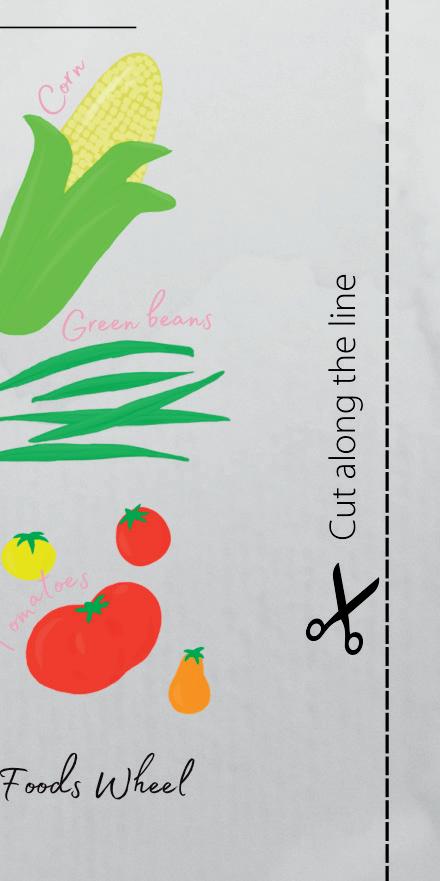
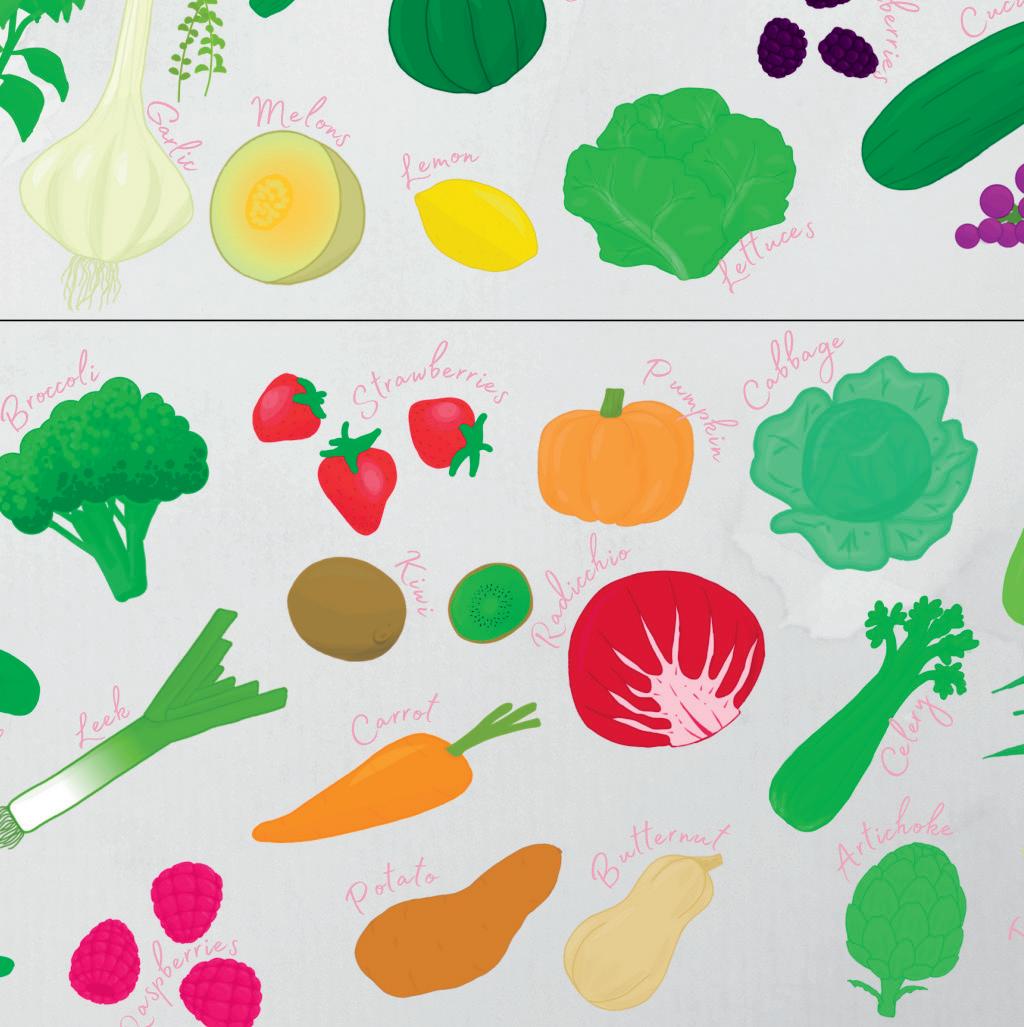
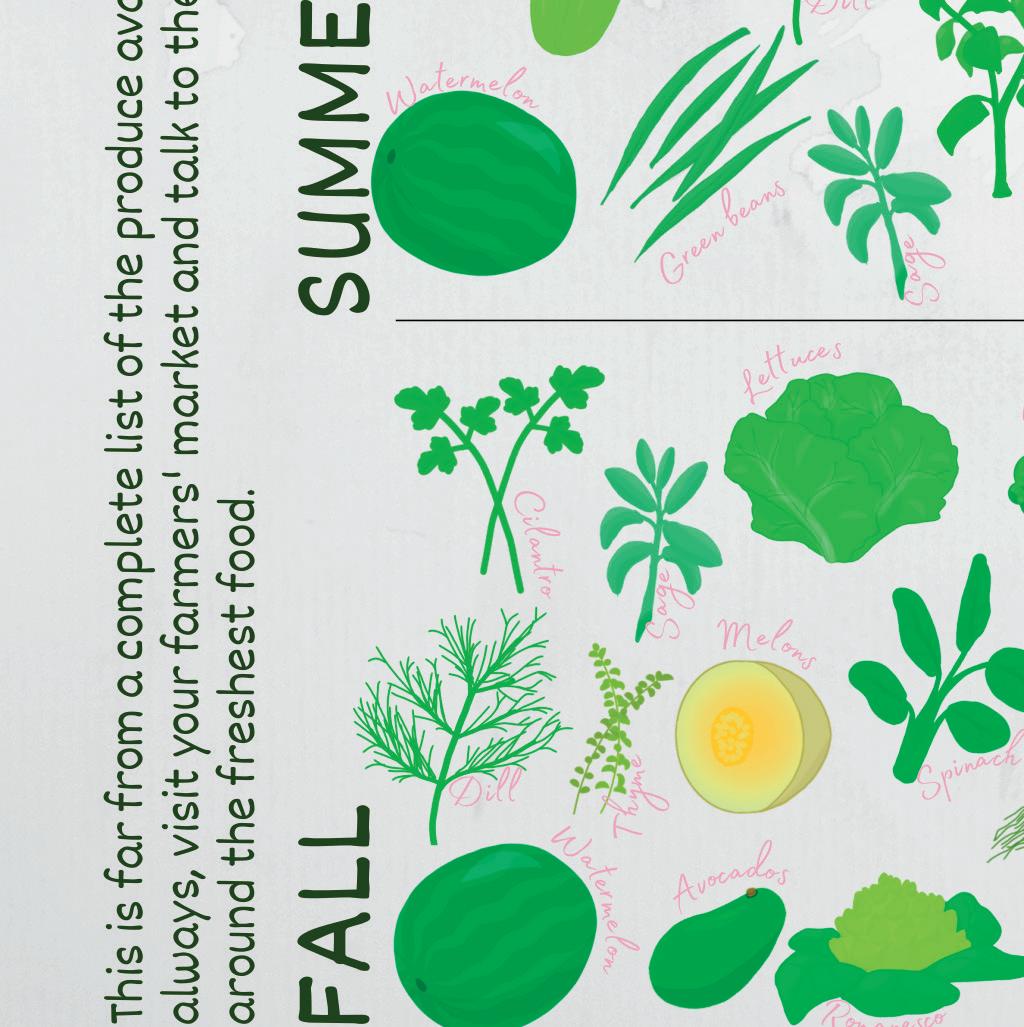
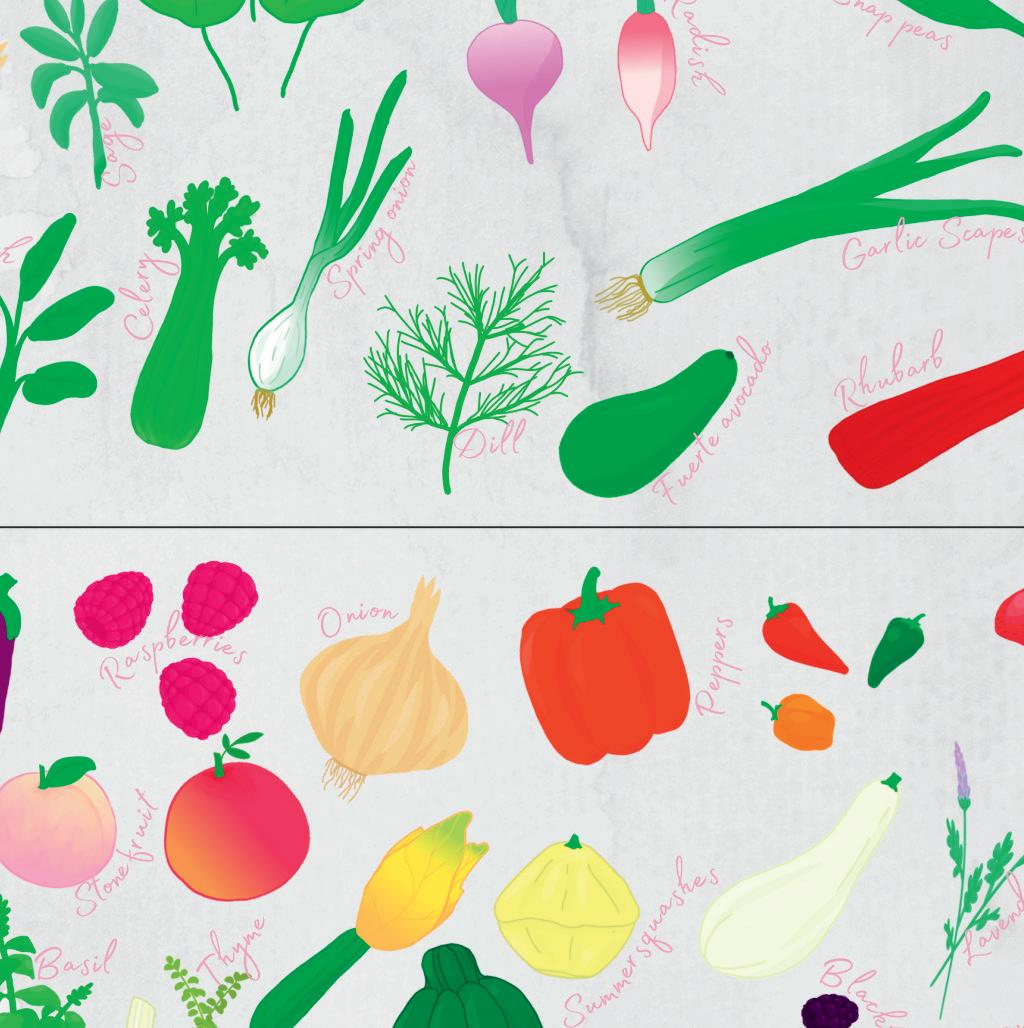
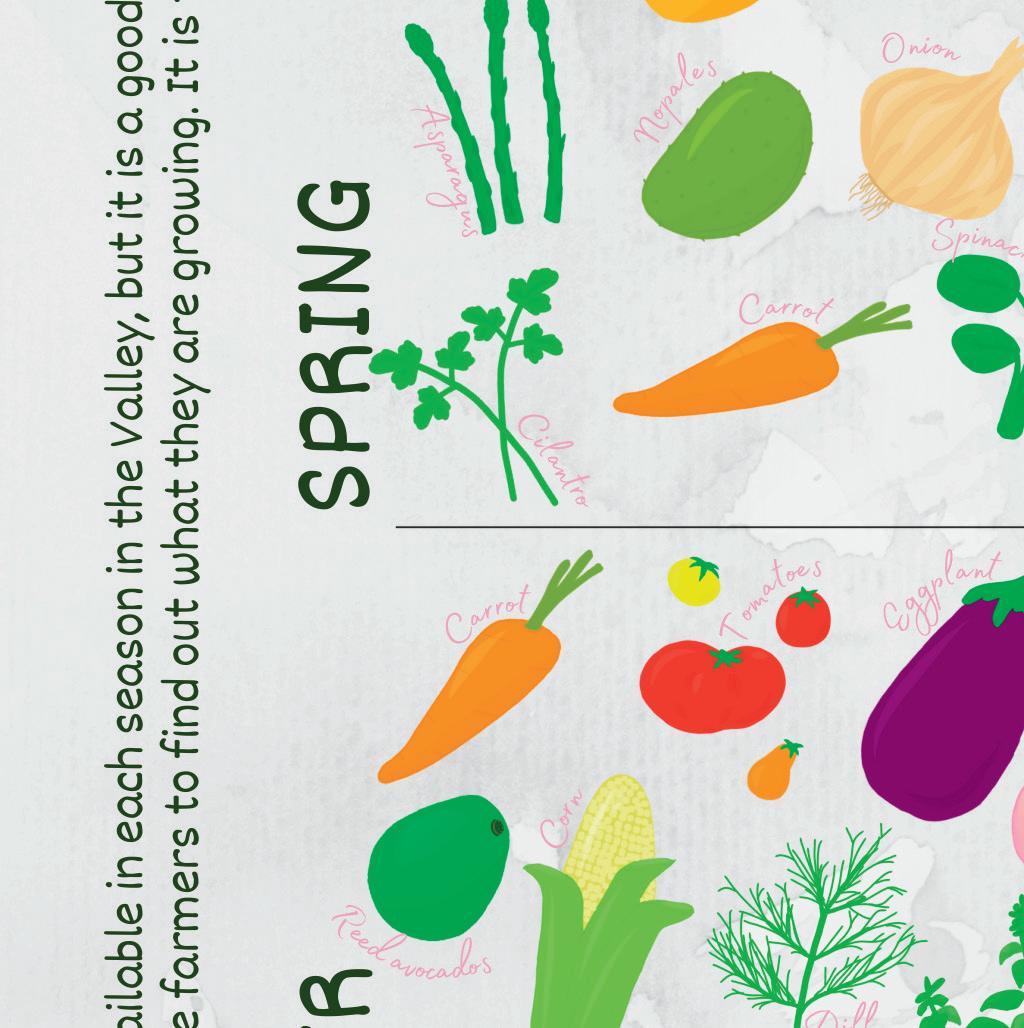

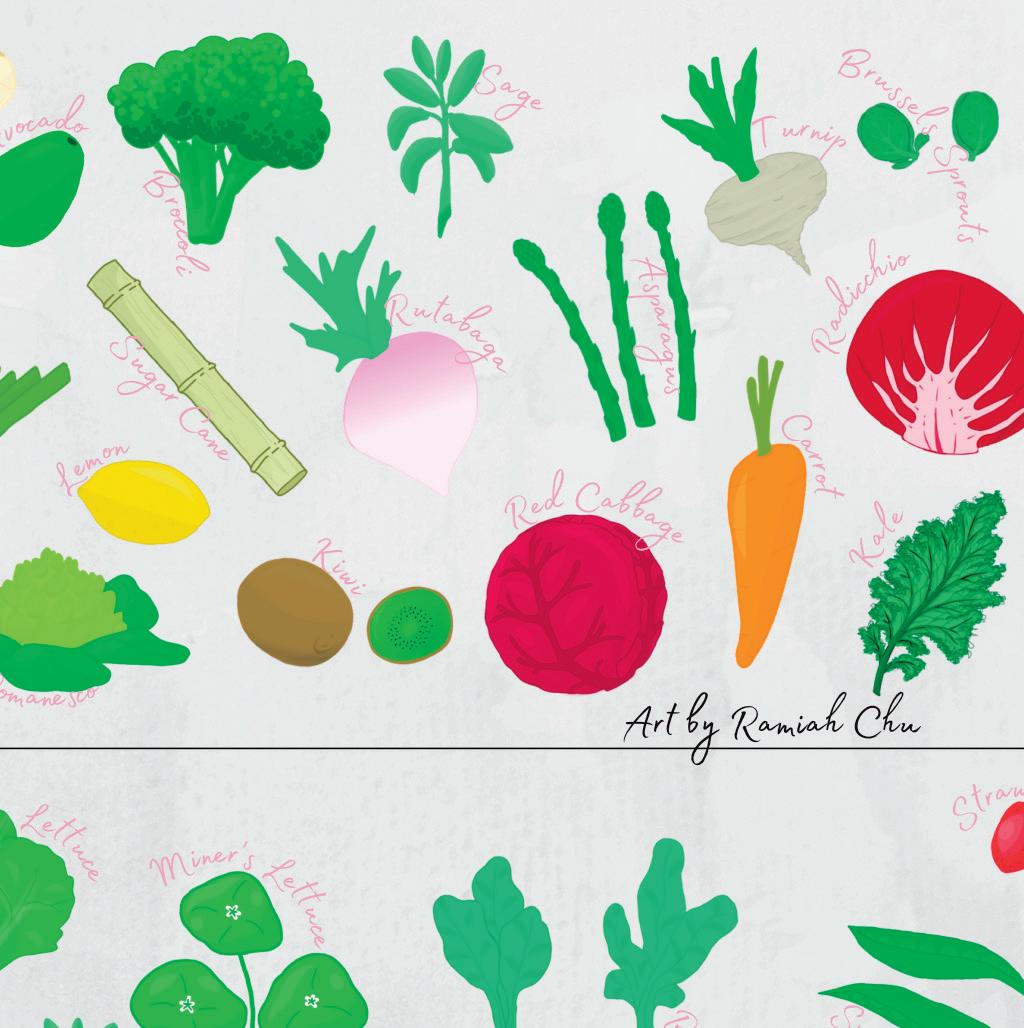
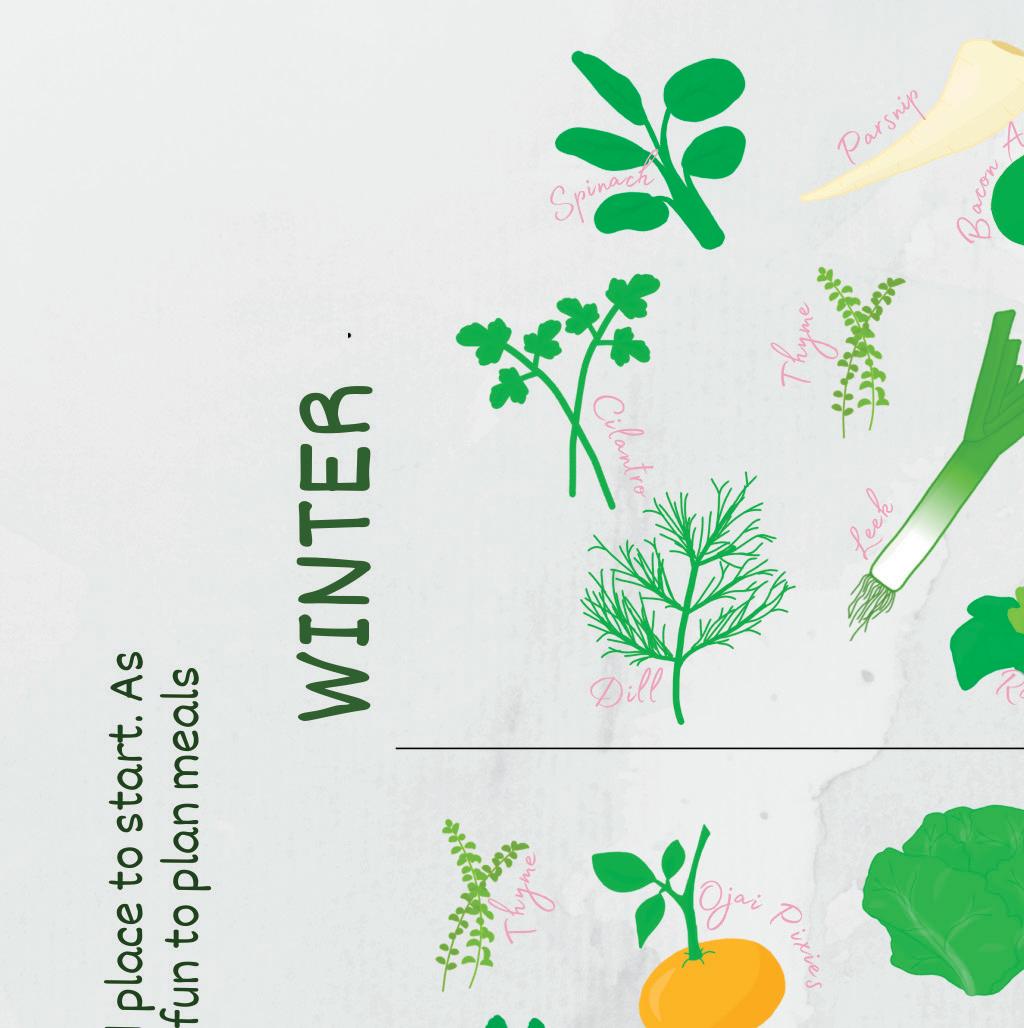

With the recent mushroom craze—the ’shroom boom, if you will—fungi are making their way to the forefront of culinary curiosity. The supermarkets now offer a wider variety of cultivated species, from oysters to shiitake and lion’s mane to maitake.

But if you are craving a deeper dive into the culinary world of fungi to sample the exotic and truly unique flavors of wild mushrooms, without proper training and identification skills you are probably out of luck. It takes many seasons, if not years, to become proficient as a mushroom hunter and gain confidence in knowing what is good to eat. Also sadly, Los Angeles isn’t known for being particularly abundant in edible wild fungi.
But if you’re craving a true taste of the wild, something that still has the essence of a rich mossy forest, the only way to obtain wild mushrooms is to collect them yourself—or find a proficient foraging friend.
Just like so many things in LA, it’s all about who you know. Consider the foragers at LA FungHi to be your connection to the tasty spoils of the wild without ever having to leave the city. This unique vendor connects with foragers from all around the world to bring the best wild foraged goods to Los Angeles. Not only do they have the widest section of wild mushrooms, but other foraged fare such as fiddlehead ferns and ramps (a type of wild garlic) often can be found in their baskets in the springtime.
If you’re looking for fresh truffles, porcini, black trumpets, chanterelles or morels for a fancy weekend dinner, be sure to stop by their stand at the farmers’ markets in Brentwood, Studio City, Venice, Pacific Palisades or Calabasas. In addition to their foraged fungi, they also offer the full spectrum of fresh cultivated species, including cordyceps, orange cloud, maitake, oysters, wood ear and many more.
And they aren’t the only ones with mushrooms at the markets. Many more vendors are popping up who are cultivating these unique fungi. Try The Fungi Valley at the Atwater Village, Hidden Hills and Silver Lake markets (and more) and Hungry Gardens at Montrose Harvest and Burbank markets.
Having access to such culinary treasures enables anyone to play with ingredients that are normally reserved for five-star restaurants. Many wild mushrooms have unique flavor profiles that expand far past the typical description of “earthy.” For example, the candy cap mushroom has a strong aroma of maple syrup when dried, while matsutake is known for its complex scent of musty cinnamon. As the culinary world is opening up to more mushrooms on the menu, we are constantly learning about new ways to use them in the kitchen with new techniques and flavor combinations. Mushrooms for dessert? Absolutely. Just turn the page . . .

This porcini ice cream with a candy cap mushroom crisp is fun to make and gives your sweet tooth a satisfying blend of sweet, salty and umami.
For the ice cream:
½ cup porcini powder
1 cup cashews, soaked for at least an hour
1 cup almond milk
¼ cup maple syrup
¼ teaspoon salt
In a preheated cast-iron skillet, lightly toast the porcini powder until fragrant, about 3–5 minutes.
Add porcini powder and remaining ingredients to a high-speed blender and blend until creamy. Adjust for sweetness if desired.
Place the mixture into an ice cream maker and follow the manufacturer’s instructions.
For the candy cap shortbread crisp:
½ cup unsalted butter, softened
¼ cup candy cap mushrooms, dried and powdered
¼ cup sugar
3 tablespoons coconut sugar
¼ teaspoon vanilla extract
1 cup fine pastry flour
¼ cup pecans, chopped and toasted
Sea salt
In a large mixing bowl, beat butter, sugars and candy cap powder together until creamy and mixed thoroughly.
Add flour and pecans, mixing until just combined without overworking the dough. Turn out onto a piece of wax paper and form into a log with about 1⅛ inches thick. Wrap the wax paper around the log tightly and refrigerate for 45 minutes. Preheat oven to 325°F.
Remove the chilled dough from the refrigerator and cut into ¼-inch rounds. Place rounds on a baking sheet lined with parchment paper, leaving about an inch between each crisp. Sprinkle the crisps lightly with sea salt.
Bake for 15–20 minutes, or until golden. Remove from oven and cool on wire racks.
To Serve: Place the candy cap crisp on a plate and top with a modest scoop of porcini ice cream. Garnish with seasonal flowers and sprinkle with white truffle salt.
TUESDAY
1 Glendale Gateway Certi ed Farmers’ Market











Tuesday 10am-2pm 801 N. Brand Blvd. Glendale SupportingArms.org/events.html
2 Hidden Hills Farmers’ Market (Exclusive Community Market)
THURSDAY
10 South Pasadena Farmers’ Market

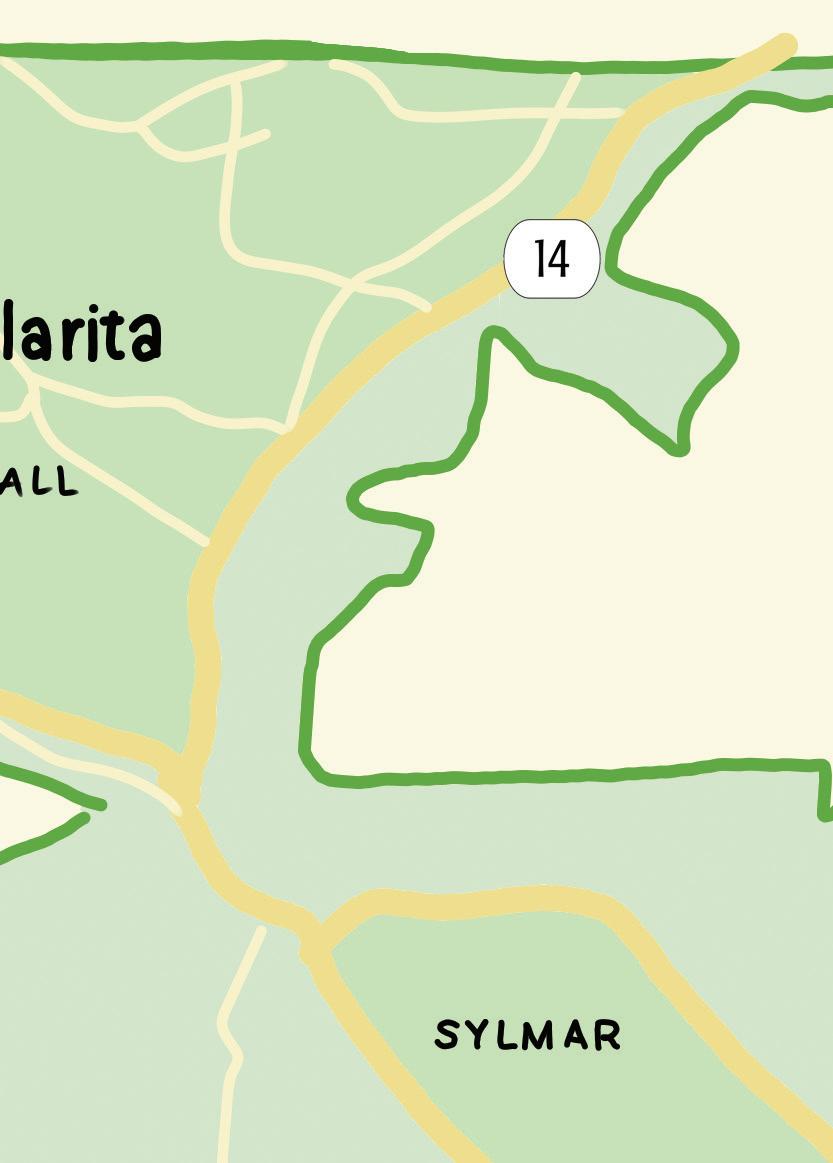
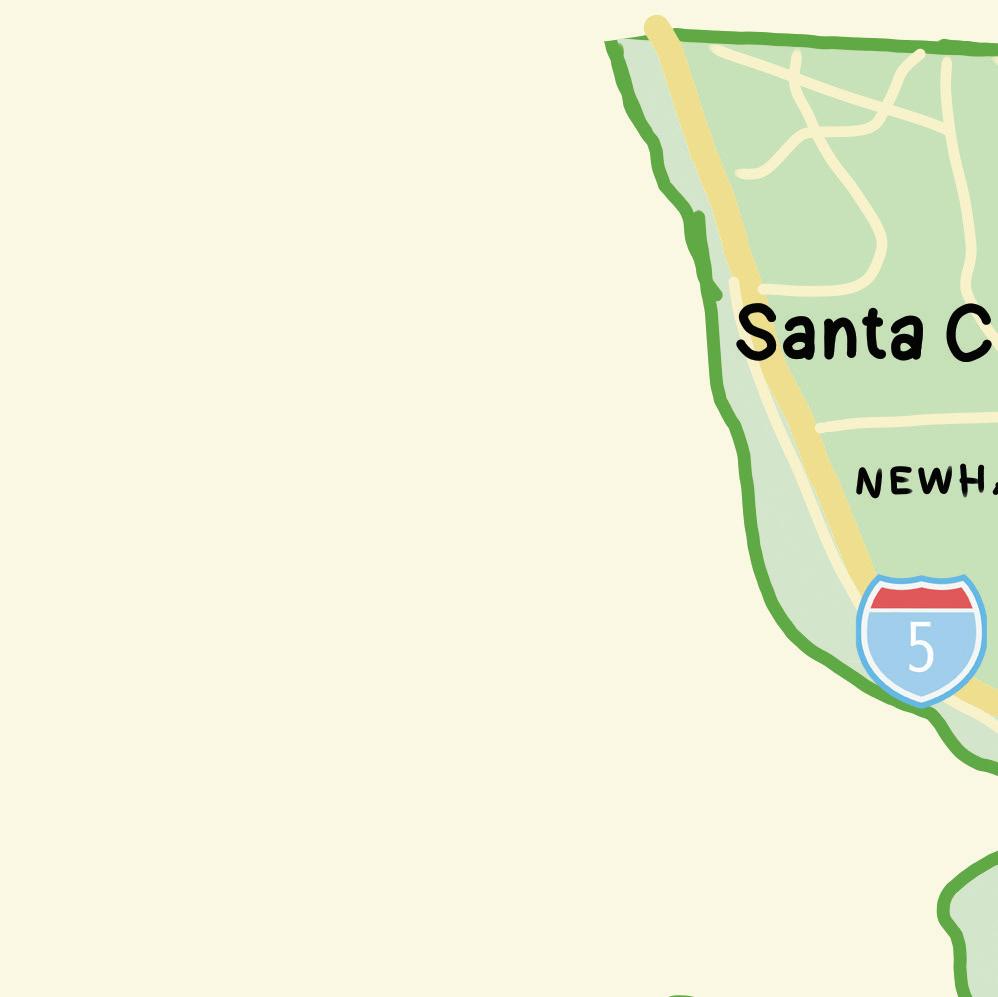
Thursday 4-8pm 920 Meridian Ave. South Pasadena SouthPasadenaFarmersMarket.org

FRIDAY
This list was updated March 2023 but as details do change, please contact the markets for the latest information.
If you know of another farmers’ market that is not listed, please let us know at info@ediblesfvalley.com.






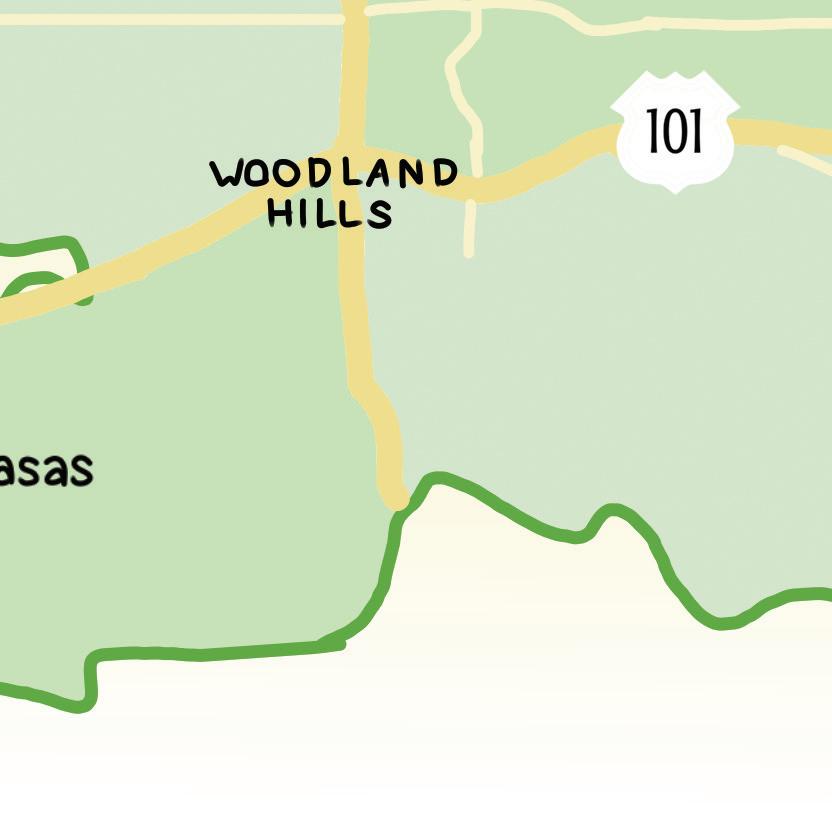

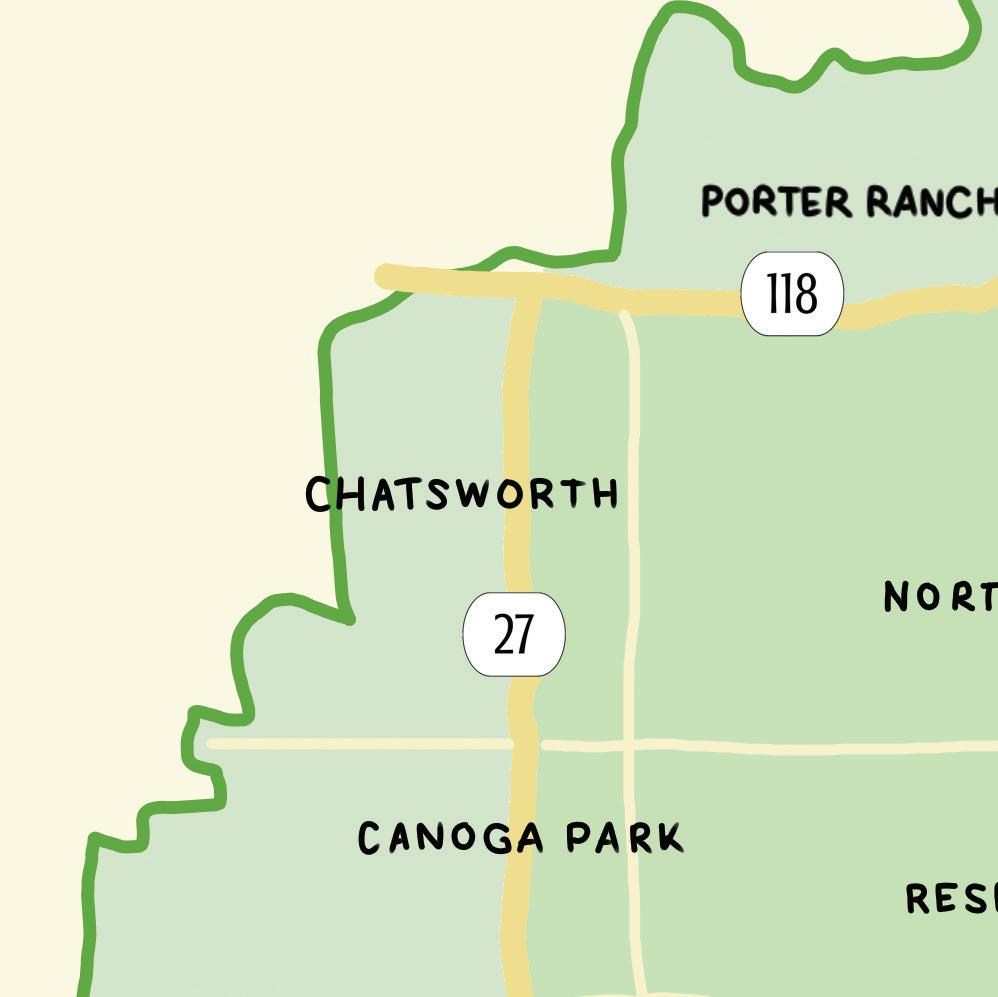
Sherman Oaks RawInspiration.org
Tuesday 10am-2pm Tuesday 8:30am-12:30pm
Tuesday 3-7pm @ccfminc 9301
11 Monrovia Farmers’ Market
Friday 5-9pm South Myrtle Ave.
MonroviaStreetFairMarket.com
Olive View Medical Center Certi ed Farmers’ Market
Friday 9am-2pm 14445 Olive View Dr.
SupportingArms.org/events.html Reseda Farmers’ Market
4-8pm
8500 Reseda Blvd.
Warner Center Farmers’ Market Friday 10am-2pm 21255 Burbank Blvd.
RawInspiration.org




15 Agoura Hills Farmers’ Market at Whizen Market Square











Saturday 11am-4pm
28914 Roadside Dr. Agoura Hills
RawInspiration.org


16 Burbank Farmers’ Market
Saturday 8am-noon
101 N. Glenoaks Blvd. Burbank
BurbankFarmersMarket.org
Farmers’ Market
Saturday 9am-1:30pm
7248 Owensmouth Ave.
CoastalPaci cMarkets.com

Farmers’ Market
Saturdays 9am- 1pm
1346 Foothill Blvd.
La Cañada Flintridge RawInspiration.org
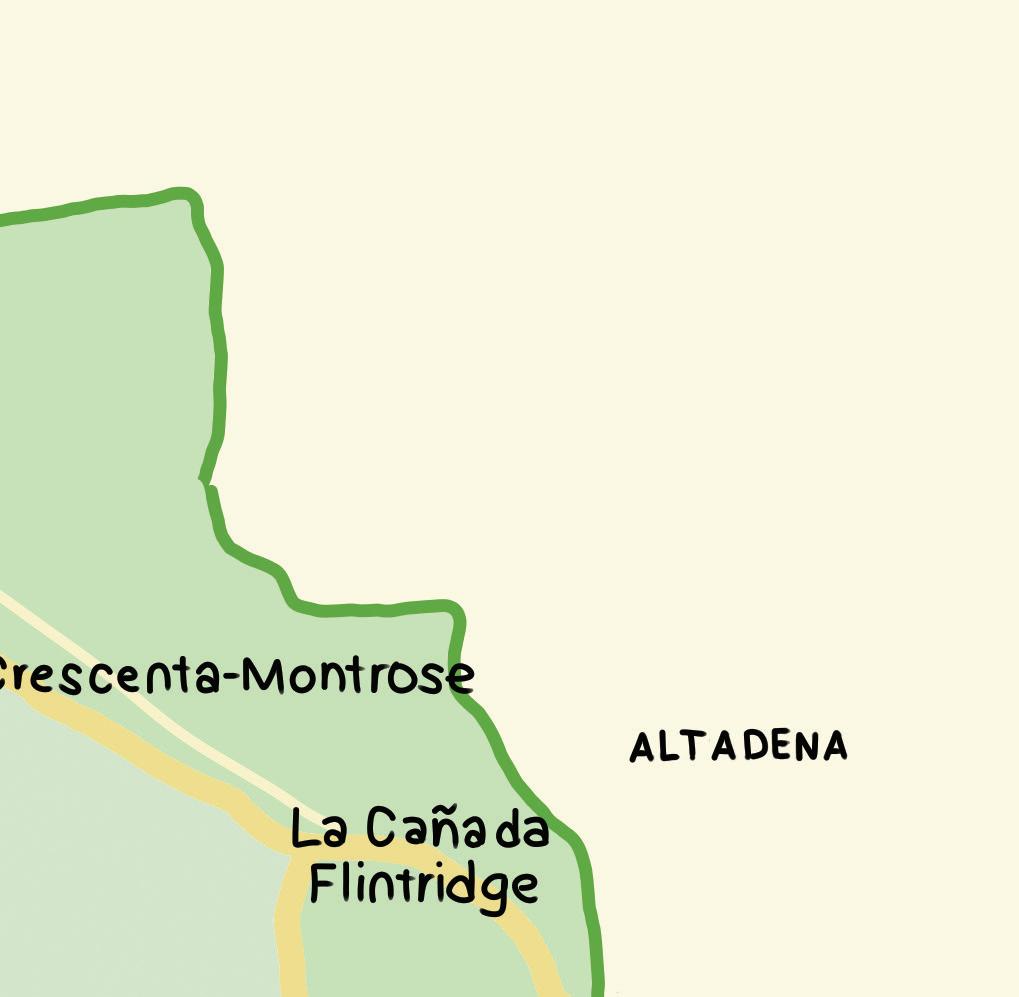
Saturday 9:30am- 2:30pm
North Hollywood
FarmersMarketNorthHollywood.com
20 Old Town Calabasas Farmers’ Market
Saturday 8am-1pm
23504 Calabasas Rd. Calabasas CCFM.com
21 Old Town Newhall Farmers’ Market
Saturday 8:30am-1pm
24500 Main St. Santa Clarita NewhallFarmersMarket.com
Pasadena Victory Park Farmers’ Market
Saturday 8am-12:30pm
2925 E. Sierra Madre Blvd.
Pasadena


PasadenaFarmersMarket.org
Woodland Hills Farmers’ Market
Saturday 8am-1pm
5650 Shoup Ave. Woodland Hills 818-300-3023
24 Atwater Village Farmers’ Market
Saturday 9am-2pm
3528 Larga Ave. Atwater Village
SeeLA.org/markets-atwater-village
25 Encino Farmers’ Market
Sunday 8am-1pm
17400 Victory Blvd. Van Nuys Sepulveda Basin
31 Forneris Farms 15200 Rinaldi St. Mission Hills FornerisFarms.com
32 Sanchez Produce
16230 Sierra Hwy. Santa Clarita @Sanchezproduce

2300-2314 Honolulu Ave.
ShopMontrose.com/harvest-market-and-marketplace
Santa Clarita Certi ed Farmers’ Market


Sunday 8am-noon
Valencia Blvd. & Rockwell Canyon Rd.
5251 Havenhurst Ave. Encino @tapiabrosfarm
South Central Farmers CSA Various pickup and delivery options SCFCoop.SouthCentralFarmers.com
StudioCityFarmersMarket.com
North Hollywood
Sunday 10am-2pm
